


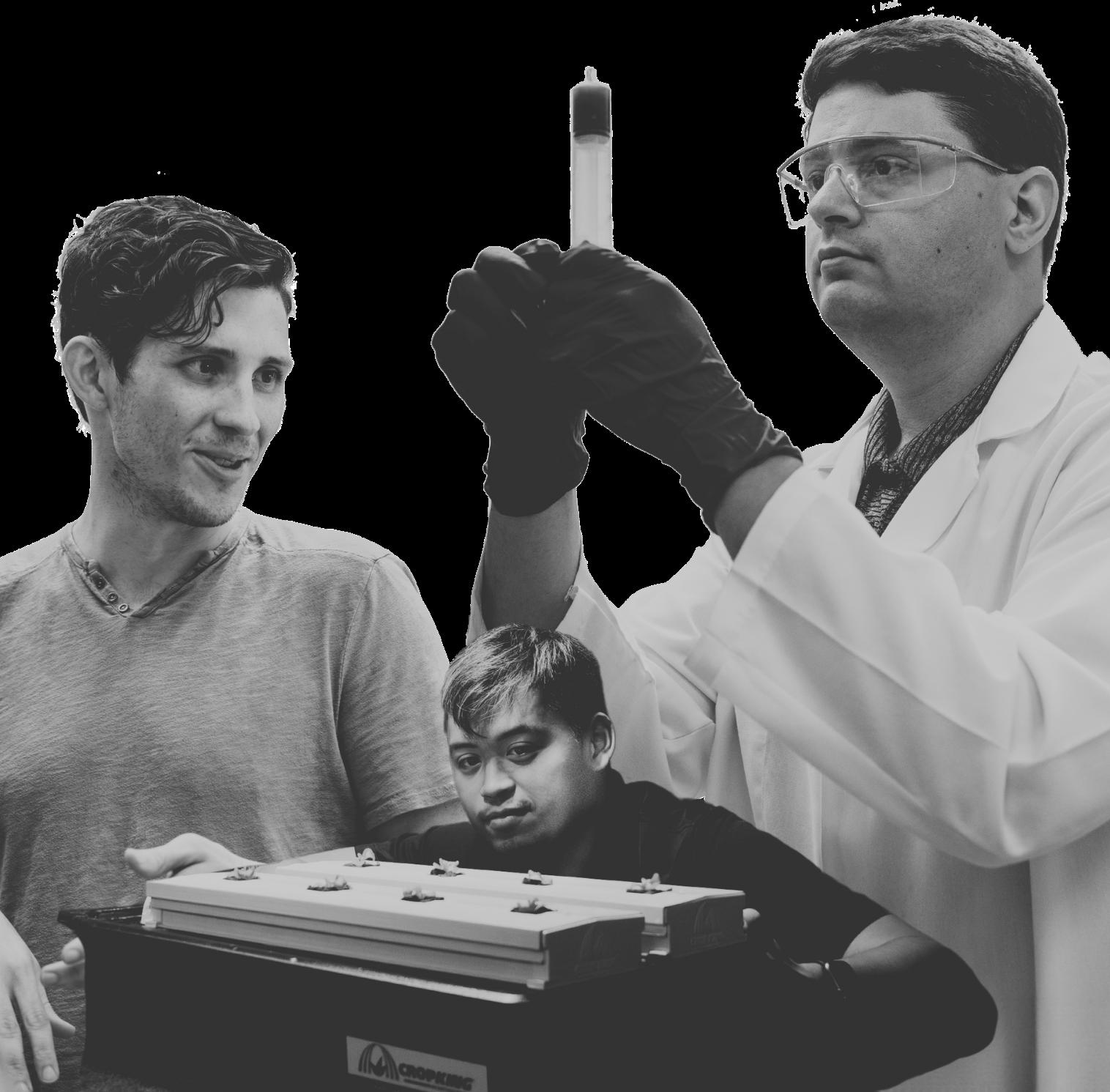
SPRING 2024
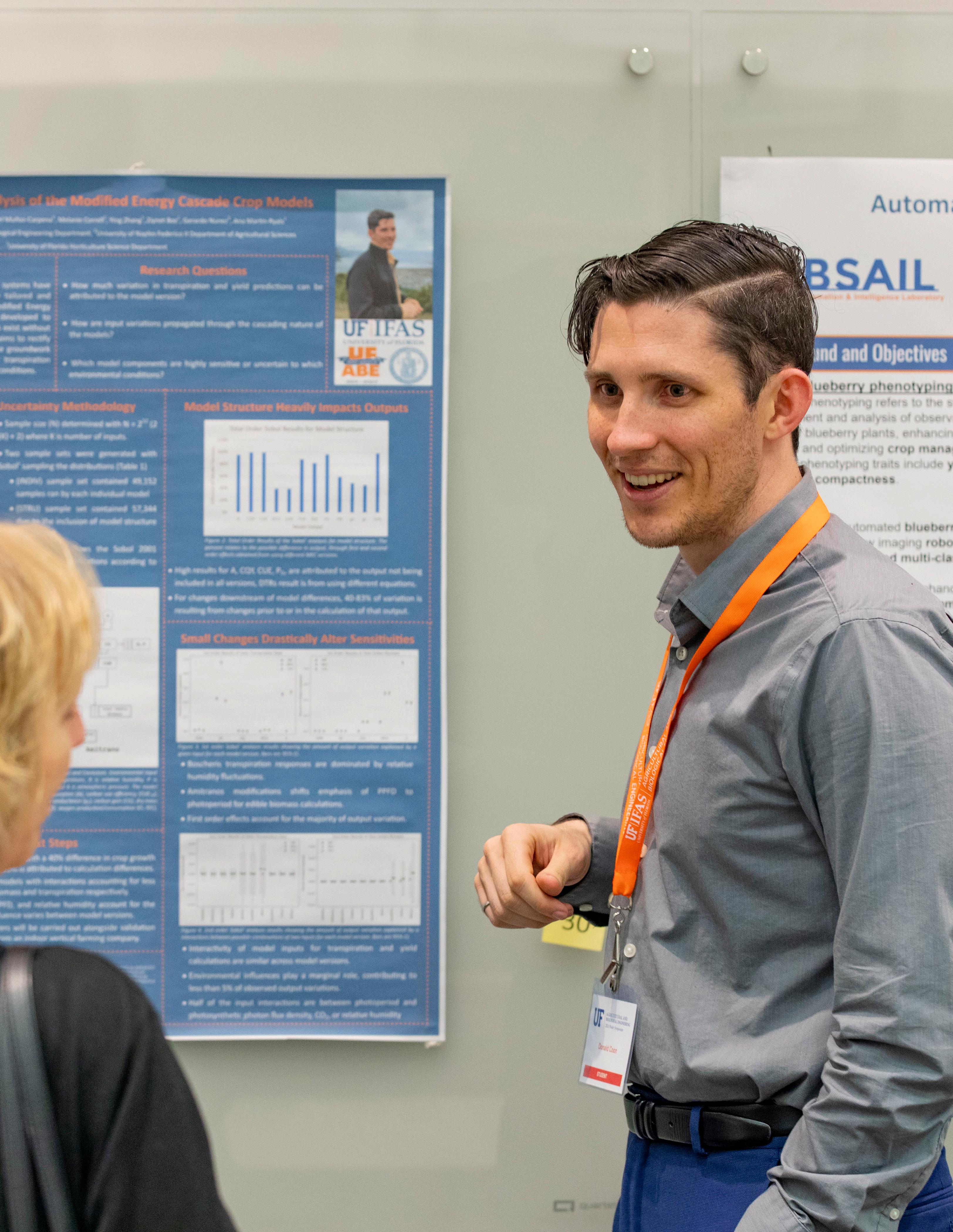
UF ABE Graduate student, Donald Coon, shares his research with Associate Dean Heather McAuslane at the 2024 ABE Poster Symposium. Donald placed 2nd in the poster competition.
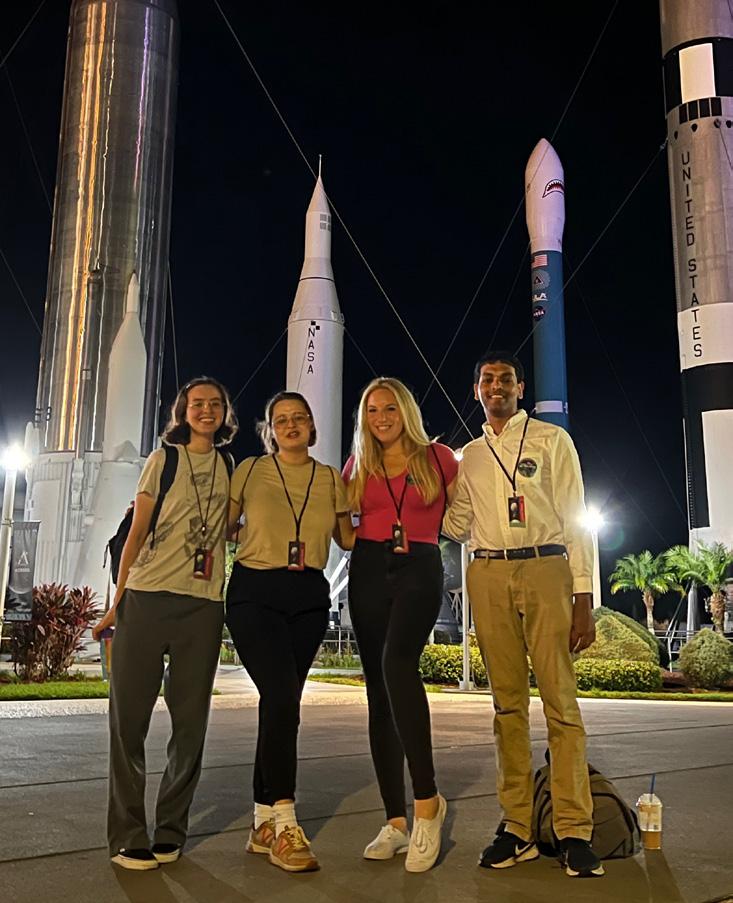
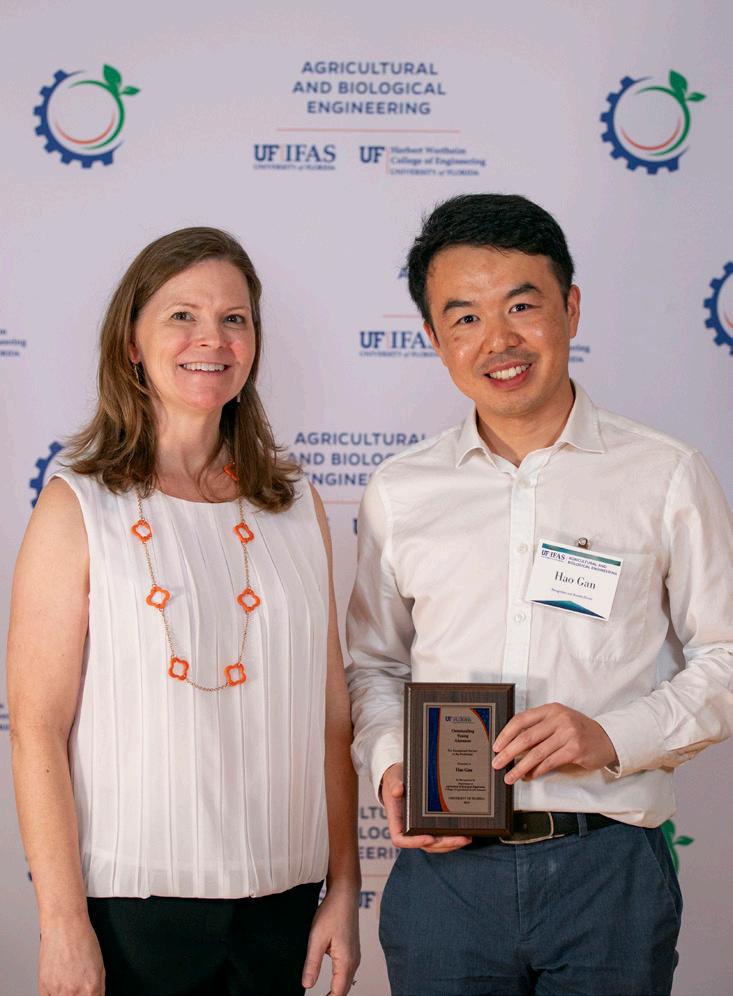
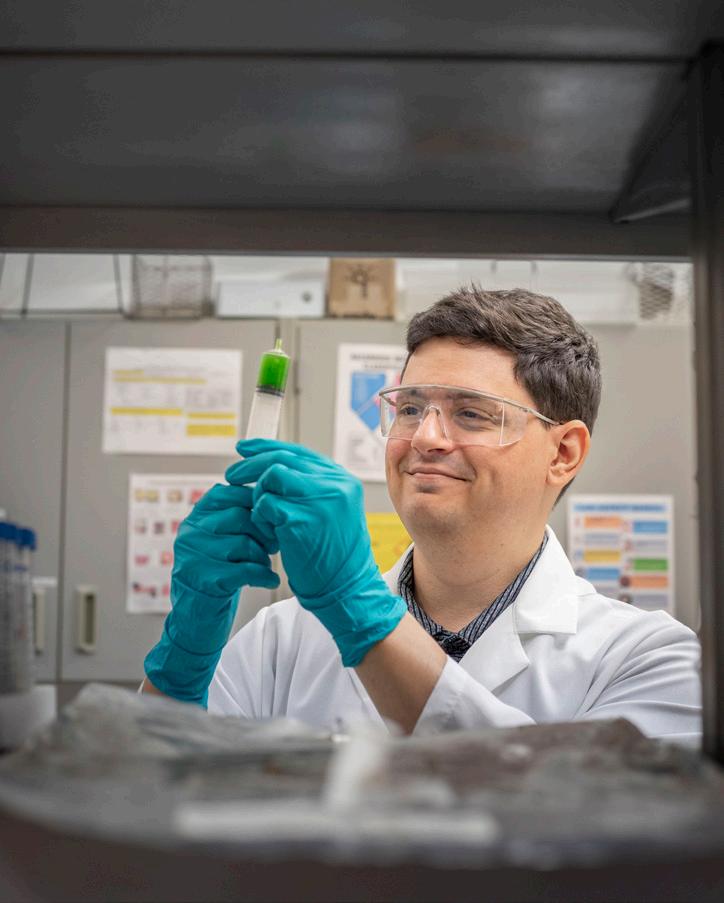
ABE UPDATE Fall 2024 | 3 TABLE OF CONTENTS COSMIC CRAFTING 06 CELEBRATING GREATNESS 23 TURNING WASTE INTO WONDER 10 EXPLORING THE RED PLANET 08 DECODING THE EARTH’S SECRETS THROUGH REMOTE SENSING 07 HARVESTING AMONG THE STARS 14 DIGITAL TWINS FOR SPACE AGRICULTURE 16 THE POWER OF PERSERVERANCE 18 THE CLASS OF 2024 20 #6 Graduate Biological/ Agricultural Engineering Program by U.S. News and World Report
UF ABE Alumna, Melissa Germain, stands with her newly received ABE 2024 Distinguished Alumni Award. To read Melissa’s graduate send-off speech, see Page 18.
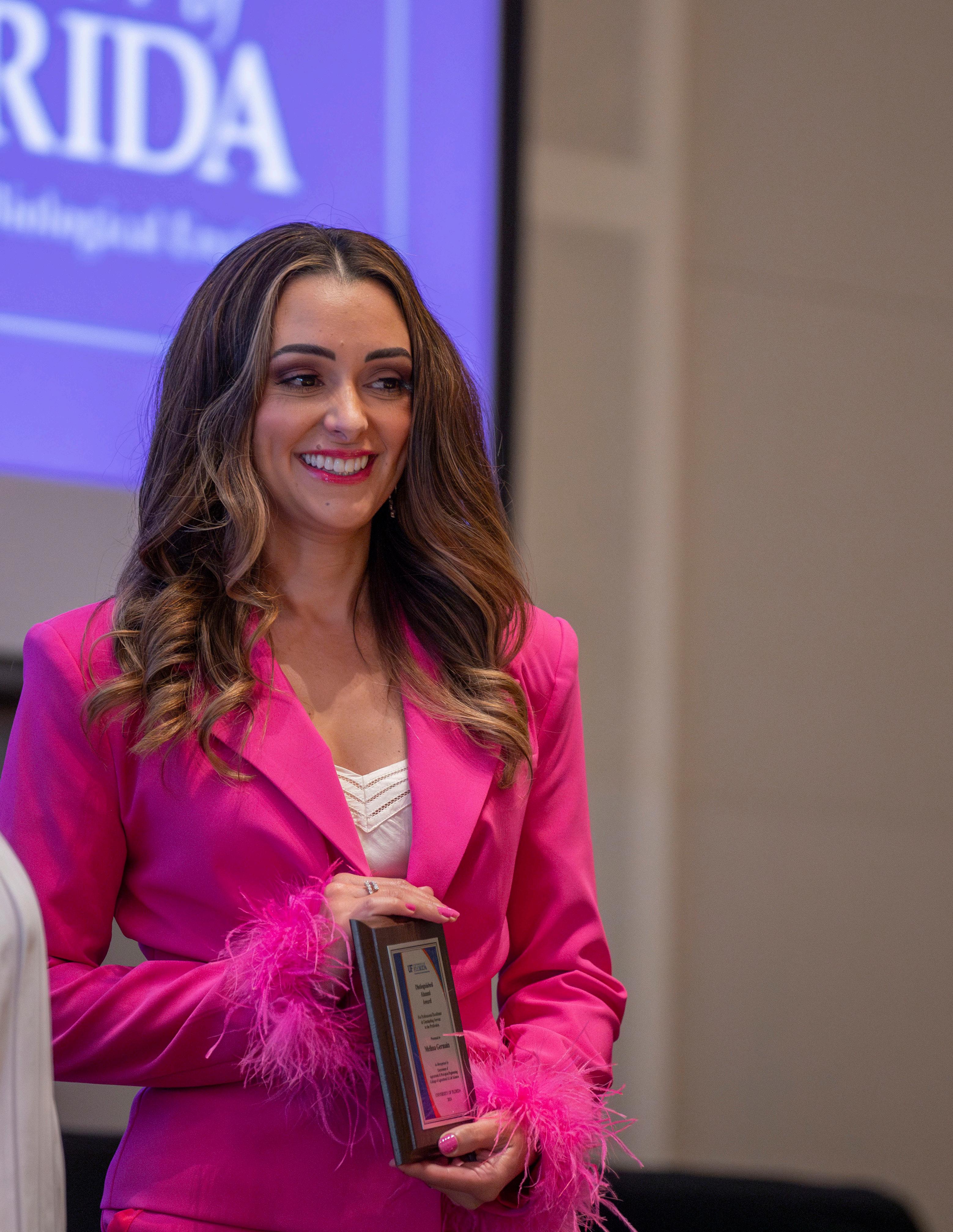
UF/IFAS Agricultural & Biological Engineering Department
Kati Migliaccio Professor and Chair
Frazier Rogers Hall
abe.ufl.edu
Editor
McKenzie Wynn
Copy Editors
Kati Migliaccio
Shannon Noble
Writers
McKenzie Wynn
Kati Migliaccio
Graphic Designer
McKenzie Wynn

Spring 2023
PO Box 110570 Gainesville,
120
FL 32611 352-392-1864
@UF_ABE /ufloridaabe @UF_ABE /company/ufabe
LETTER FROM THE CHAIR
 KATI MIGLIACCIO, PH.D.
KATI MIGLIACCIO, PH.D.
CHAIR AND PROFESSOR
ABE Friends,
The Agricultural and Biological Engineering department was a busy place this spring! We enjoyed several events including our Emeritus and Retired Faculty lunch, ABE Spring Semester Open House, the two-day Advisory Board Meeting, the ABE Recognition and Awards Dinner, and Graduation!!! This ABE Update highlights many of these events and our outstanding students, staff, and faculty that make it possible.
In ABE... It feels like home “ ”
Our department is truly a place where students grow and develop their skills for successful professional careers. We continually seek ways to improve the learning experience for students and the resources available for faculty to teach. Toward this effort, we started a campaign to build a new teaching building for experiential learning for our Agricultural Operations Management (AOM) and Biological Engineering (BE) programs. We are delighted to have received funding for this building through a generous donation. The building will be named in honor of W.W. Glenn who was an outstanding IFAS Extension agent serving our state and its growers. The new building is anticipated to host its first classes in the Fall of 2025. This facility will bring great opportunity to our students, our stakeholders for engagement, and our faculty to truly enhance the learning environment. We are so excited for this addition!!
“ ”
I’m very happy with everything I got to learn in this major
If you ask our faculty, what excites you the most about being a faculty member – they will say our students! I have the privilege at the end of each semester to meet with students who are graduating and learn about their experiences. They also complete an online form that includes an open-ended question about their experience in the department. Their responses are a result of our ABE community and their dedication to our students –this includes staff, faculty, alumni, and supporters. I will share a few of these with you as contributors the program.
“ ”
Everyone wants to help you succeed
“The difference between ABE and the engineering/business schools is night and day. My previous experiences almost felt commercial with stale atmospheres, tedious theoretical assignments, and little to no interaction with professors. In ABE, I love the professors, loved the environment, and loved the classes. It feels like home.”
– Graduated undergraduate AOM student
“I had a wonderful time in this major, and I am very grateful that I chose this major when I was a freshman. None of the classes were easy, but it was worth the work put in over the past years. It worked great for me that the class sizes within ABE are smaller, as it makes it easier to get to know your professors and classmates. I’m very happy with everything I got to learn in this major.” – Graduated undergraduate BE student
“Fantastic department with a supportive group of faculty and staff. Everyone wants to help you succeed and can help point you in the right direction for whatever you need. The environment and relationships between faculty and students is what made the undergraduate experience so special for me .” – Graduated undergraduate BE student
I am very grateful to be part of ABE and have the opportunity to meet and be amazed by the wonderful students walking through our doors.
Go Gators!
ABE UPDATE Fall 2024 | 5
Cosmic Crafting
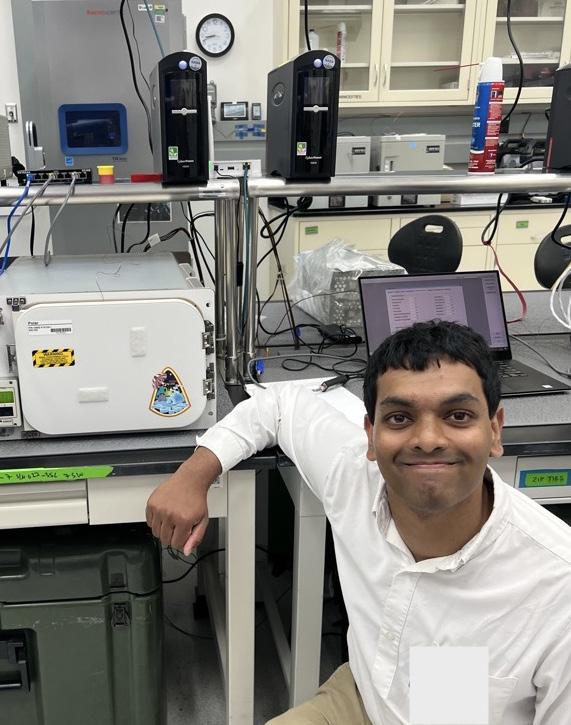
UF ABE Graduate Student, Jithran Ekanayake with the SpaceX cryostorage device (called a Polar) used to transport the B-SURE experiments into space. The Polar kept samples frozen during transport to and from the ISS, and in between incubation periods aboard the ISS during the mission.
In the ever-expanding realm of space exploration, JITHRAN EKANAYAKE , a graduate student in Agricultural and Biological Engineering, is diving into new horizons within the department.
Supported by advisors DR. ANA MARTIN-RYALS from the Agricultural and Biological Engineering (ABE) Department and DR. AMOR MENEZES from Mechanical Aerospace Engineering (MAE), Jithran’s mission is straightforward: to unlock the secrets of self-sufficiency for astronauts embarking on extended journeys beyond Earth.
JITHRAN EKANAYAKE IS ON A QUEST TO TURN BACTERIA INTO BIOPLASTICS... IN SPACE!
His research delves deep into biological in situ resource utilization (ISRU), a groundbreaking approach that taps into the natural capabilities of microorganisms like bacteria and fungi to produce essential compounds. At its core, Jithran’s work seeks to answer a fundamental question: How can astronauts sustain themselves during long voyages to destinations like the Moon and Mars, where resupply missions pose significant challenges?
A key focus of Jithran’s research is investigating bacteria’s ability to make bioplastics in space. This is crucial for creating a self-sustaining system where astronauts can make essential items like food, medicine, and building materials. By studying how reduced gravity affects bacteria and bioplastic production, Jithran aims to find new ways to support life in space.
The focus of Jithran’s study revolves around bacteria from the genus Cupriavidus , known for their ability to produce poly(3-hydroxybutyrate) (BHP) , a biodegradable alternative to traditional plastics. Through strategic engineering, these bacteria could thrive in
simulated space environments, offering a continuous supply chain of bioplastics tailored for applications like 3D printing. This breakthrough promises swift responses to maintenance and infrastructure needs during space missions, heralding a new era of space sustainwability.
Jithran and his team have achieved notable success in streamlining the deployment of experiments to the International Space Station (ISS). This accomplishment boosts their capacity to uncover insights into microbial behavior in space, laying a robust foundation for future breakthroughs in space biology.
As humanity ventures into the unknown, Jithran dreams of a future where bioplastic production expands, and our understanding of how microorganisms behave in space environments deepens. He’s committed to ensuring that space exploration inspires and includes all, propelling our journey into space with boundless possibilities.
ABE UPDATE 6 | Fall 2024
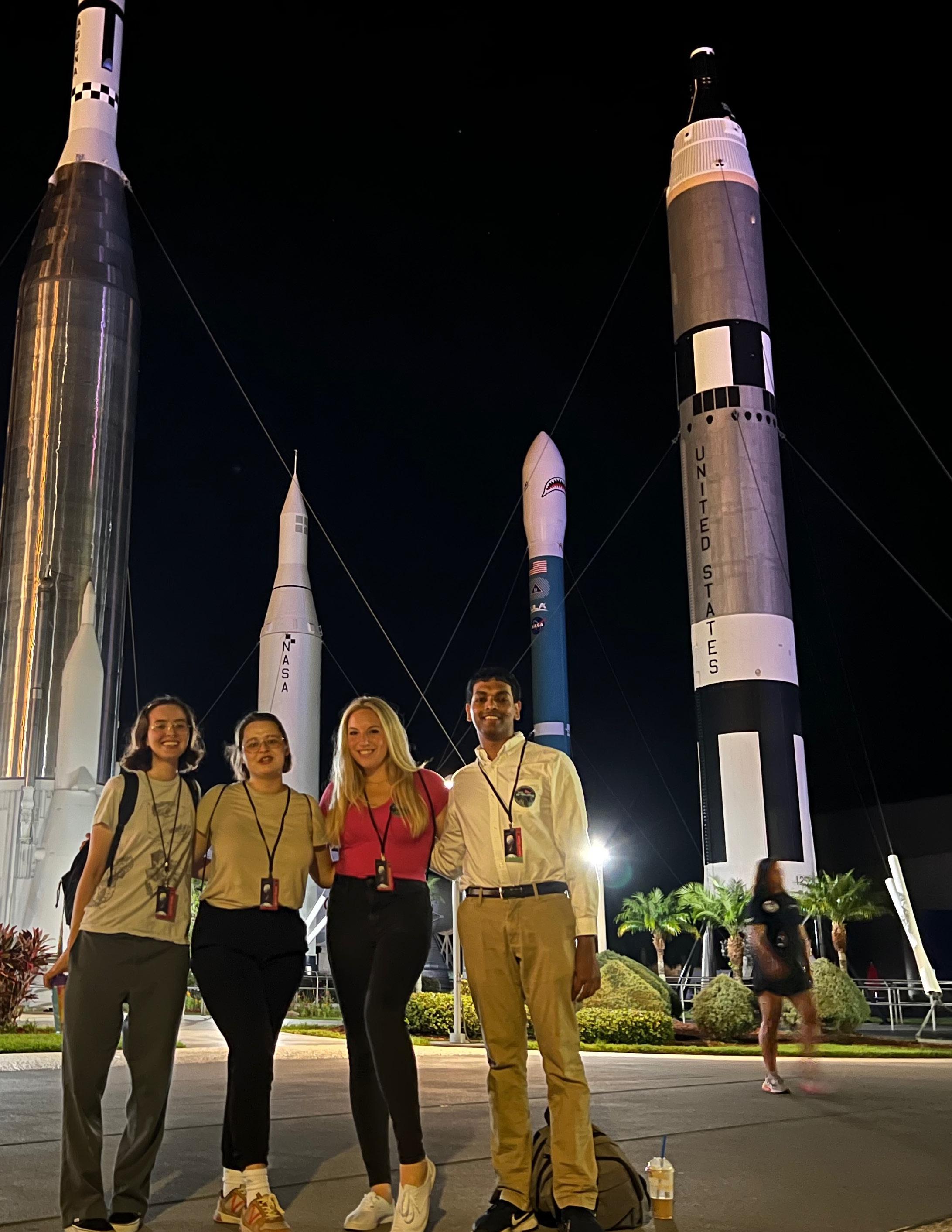
Researchers from the University of Florida at Kennedy Space Center in August 2023, hours before the second launch of B-SURE experiments to the ISS via SpaceX Crew-7 (L-R) Onika Lyman, Anya Volter, Hannah Roberts, Jithran Ekanayake.
UF ABE ALUM, DR. PAULO YOUNSE, IS REVOLUTIONIZING MARS EXPLORATION AT NASA
Exploring the Planet Red
Since graduating from UF, DR. PAULO YOUNSE has worked on two rovers that have landed on Mars, including the Mars Science Laboratory and Mars 2020 rovers. He participated in astrobiology field campaigns in the Arctic Circle and carried out experiments on zero gravity flights.
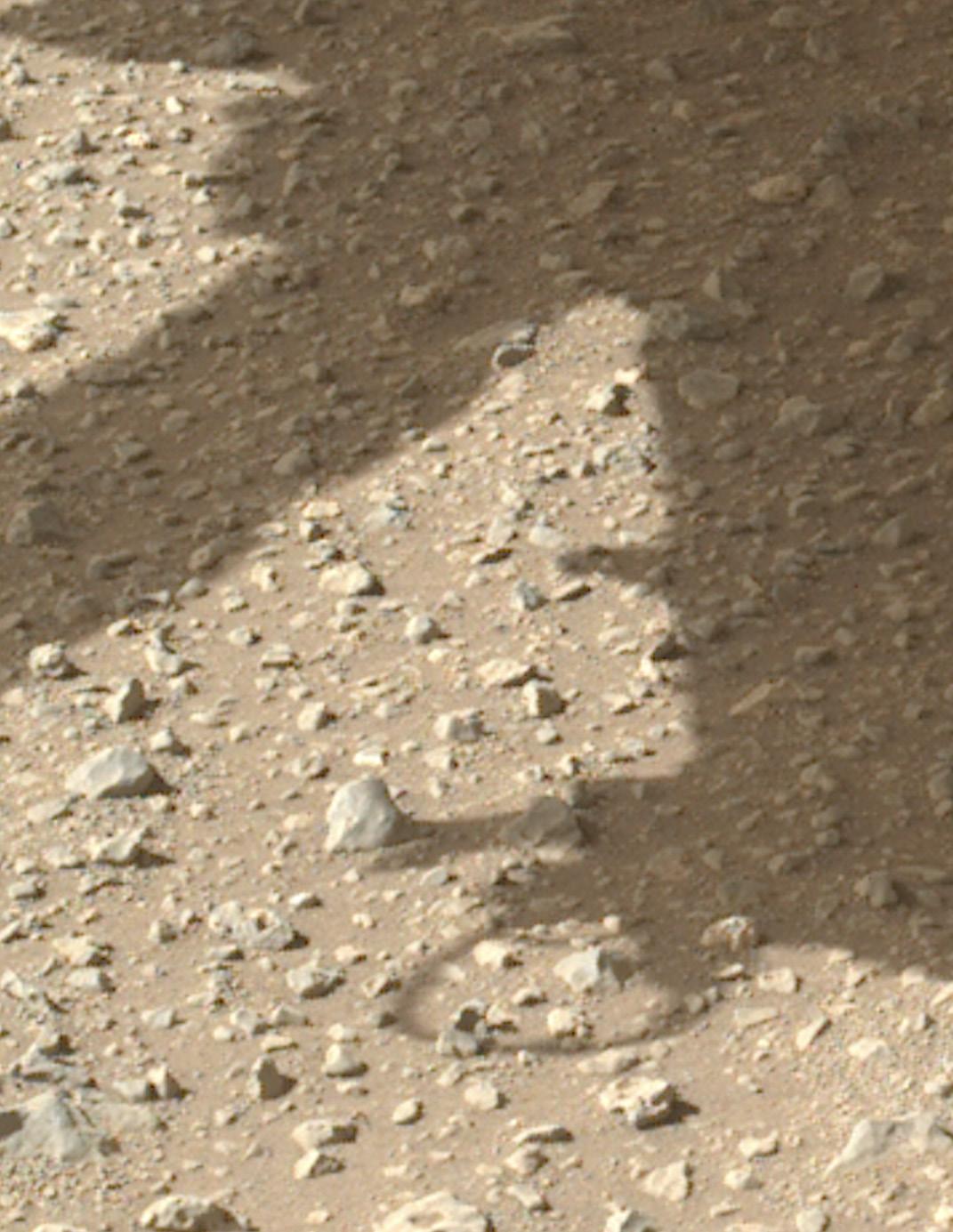
Dr. Younse’s dream is to help discover signs of past extraterrestrial life on the planet Mars and in the universe. His ABE graduate program provided him with a solid foundation in engineering, mathematics, and robotics, enabling him to secure a position as a robotics engineer at the NASA Jet Propulsion Laboratory in Pasadena, CA directly after graduation. He took on lead technical roles on various R&D and space flight projects. His Master’s research, under the guidance of advisor Dr. Burks, equipped him with the research skills necessary to successfully conduct innovative research at the NASA Jet Propulsion Laboratory.
One notable achievement is his design of the hermetic seals for the Mars 2020 sample tubes, crucial for sealing, containing, and protecting Martian samples while on Mars and during their journey back to Earth as part of the Mars Sample Return Campaign. He finds it exhilarating to see his designs on the surface of Mars in photos taken by the Mars 2020 rover.
In Dr. Younse’s current role, he is leading a team developing tools to open the sample tubes within glove box isolators for the proposed Sample Receiving Facility upon the eventual return of the samples to Earth.


Dr. Paulo Younse’s work is visible in photos taken by the Mars 2020 rover on the surface of Mars!
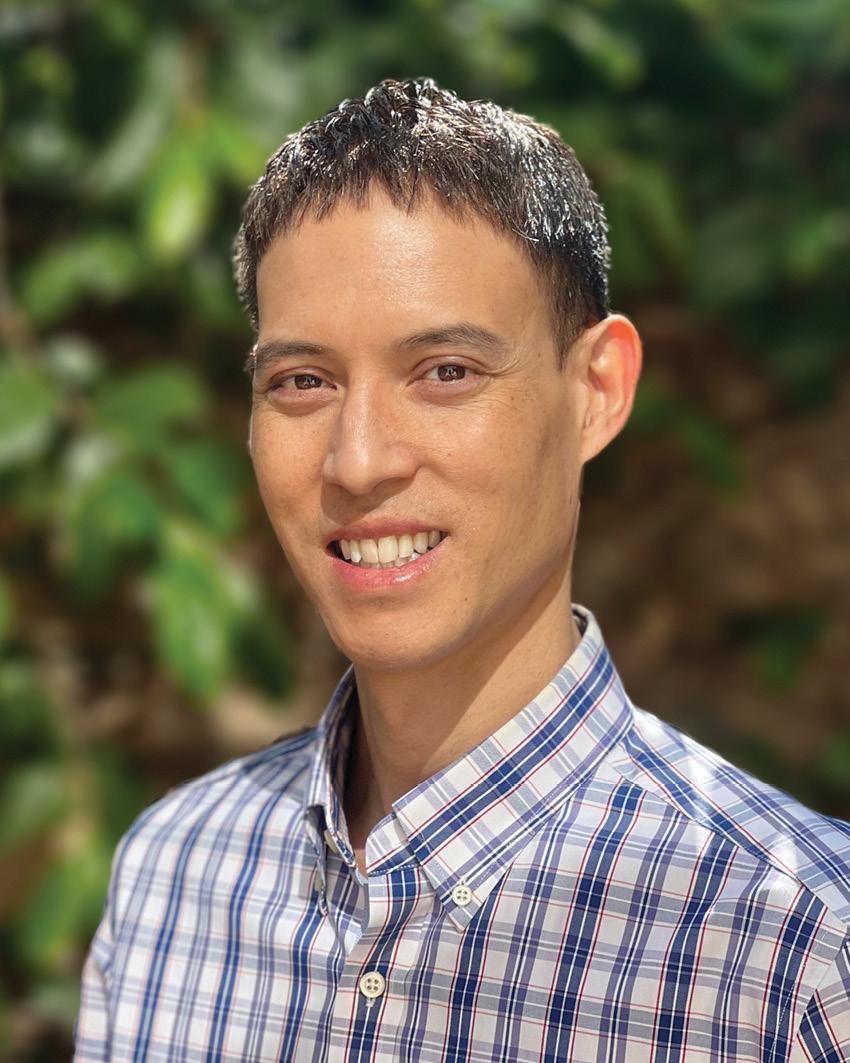
DR. PAULO YOUNSE
Robotics Engineer
NASA’s Jet Propulsion
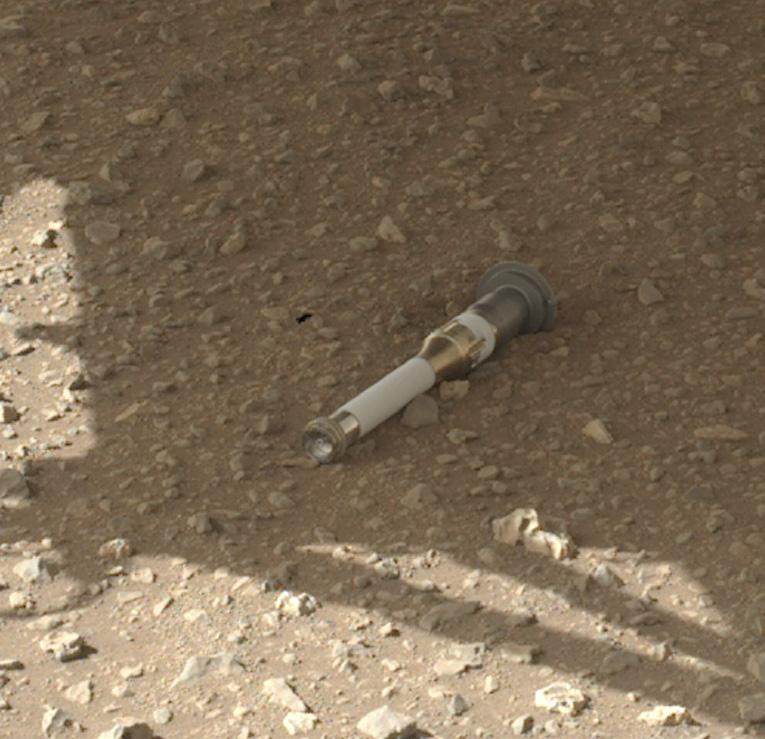
Laborator
Paulo Younse, a robotics engineer at NASA’s Jet Propulsion Laboratory, is known for his expertise in mechanical design, machine vision, and planetary sample collection. While he’s notably led the development of Mars 2020 rover’s sample caching system and hermetic seals for sample tubes, he’s made significant strides in diverse fields, including unmanned underwater vehicles at Boeing and agricultural robots at the University of Florida. Currently, as Product Delivery Manager for the Robotic Transfer Assembly System, he plays a pivotal role in Mars Sample Return. Additionally, he serves as a Co-Investigator for Martian sample handling technology. His achievements reflect his dedication to space exploration. In 2023, he was honored with the UF ABE Distinguished Alumni Award.
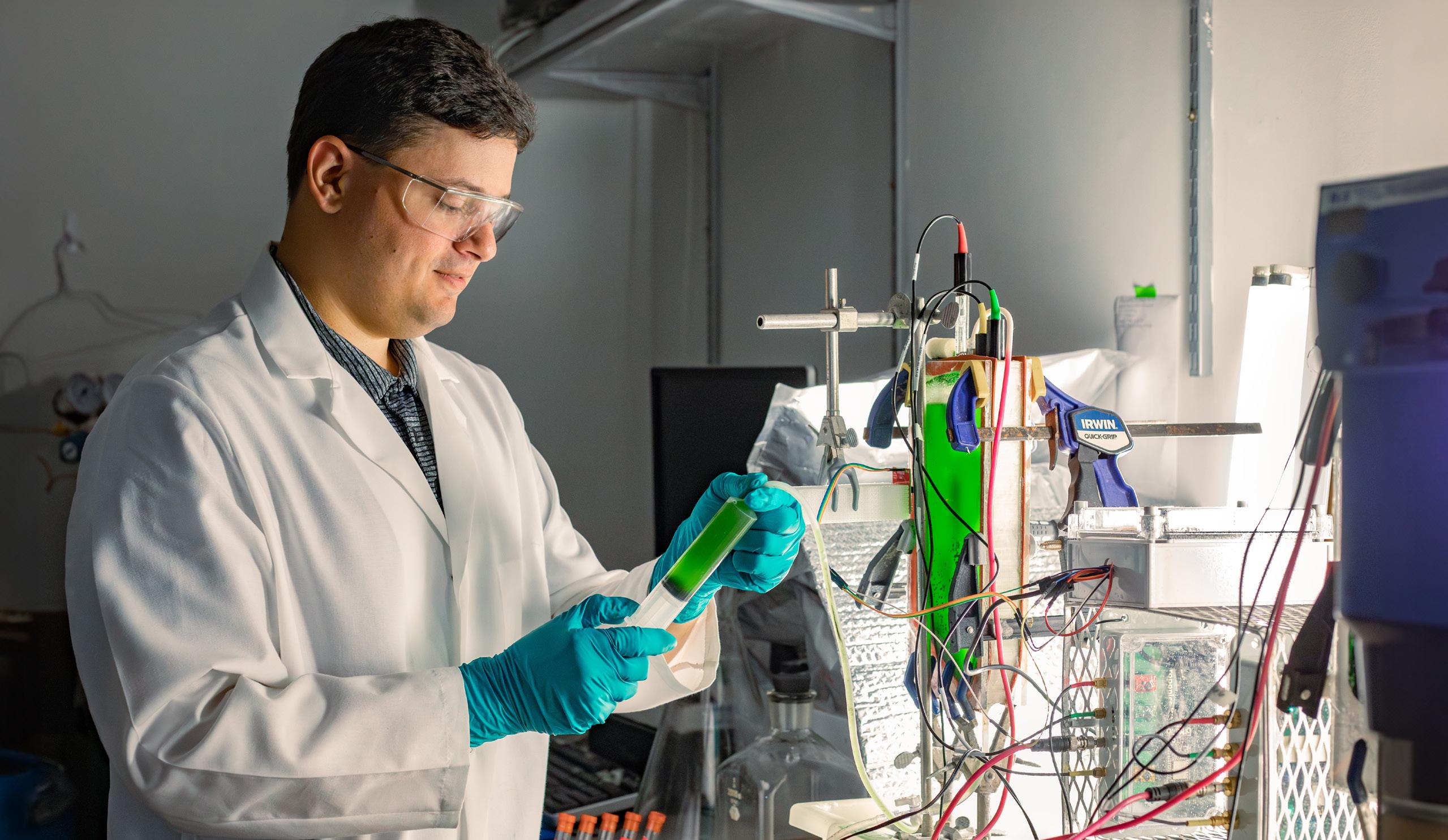
Turning Waste intoWonder
NATHAN O’NEIL IS UNLOCKING THE POTENTIAL OF CYANOBACTERIA FOR SPACE MISSIONS
Stepping into the realm of algae research, NATHAN O’NEIL seamlessly integrates biology, engineering, and space science to unlock the potential of microscopic organisms. Joining the Agricultural and Biological Engineering department in 2019, alongside assistant professor DR. ANA MARTIN-RYALS and associate professor DR. PRATAP PULLAMMANAPPALLIL, Nathan ignited a passion for discovery, discovering a world teeming, quite literally, with possibilities.
Nathan’s research focuses on understanding how this organism thrives on the products of anaerobic digesters. The cyanobacteria are not in the digester system itself but are fed its water and gas outputs, making this a crucial part of eco-friendly systems.
one person’s trash is another person’s treasure “ ”
As Nathan embarked on his journey, he quickly found an interest in leveraging his background in microbiology. Central to his work is the application of a novel marine cyanobacteria, cyanothece BG11, a promising candidate for application in controlled systems due to its resilience and adaptability.
Nathan’s research goes beyond just studying this strain. He aims to change the way we use resources and manage waste by promoting bio-circularity—a method that minimizes waste and maximizes resource use within closed-loop systems. This concept embodies a holistic approach to resource management where waste is converted into useful resources, as the saying goes, “one person’s trash is another person’s treasure.”
His work extends beyond academia, advocating for
10 | Fall 2024
sustainability in bio-production systems and offering hope for a planet grappling with environmental degradation. By studying marine cyanobacteria, especially how they grow in certain environments, Nathan aims to make a significant difference in how we take care of our planet and explore space sustainably. These organisms’ adaptability to extreme conditions and their ability to thrive in controlled environments, similar to space habitats, make them ideal candidates for space applications. He imagines a future where organisms like marine cyanobacteria can help support life in space habitats, making it possible for people to live and work in space for long periods even with limited resources.
Nathan’s goals reach beyond space, resonating deeply with challenges here on Earth. He emphasizes the broader significance of space research by drawing parallels between spacebased innovations and their potential applications on our planet. Nathan believes that cutting-edge research conducted in space can be utilized to address real-world challenges, including environmental sustainability and resource management.
In Nathan’s vision, the lines between exploring space and applying discoveries on Earth become less defined, ushering in a new era of scientific exploration. He’s eager to see his research put to practical use, especially in creating systems that treat wastewater and support space missions. His vision involves combining anaerobic digestion with algae cultivation to develop solutions for both environmental and space challenges.
Nathan’s work in bio-circularity and space exploration holds promise for a future where resource utilization is efficient, sustainable, and adaptable to the demands of space exploration and the needs of our planet. Nathan is at the forefront of a new era of exploration. His research serves as a beacon of innovation, resonating with solutions that extend beyond Earth’s boundaries, shaping a brighter, more interconnected future for all.
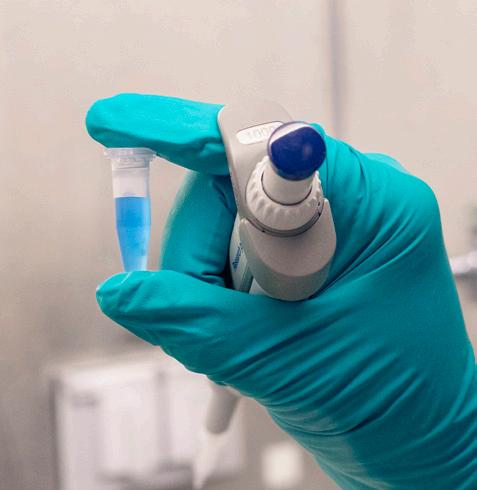
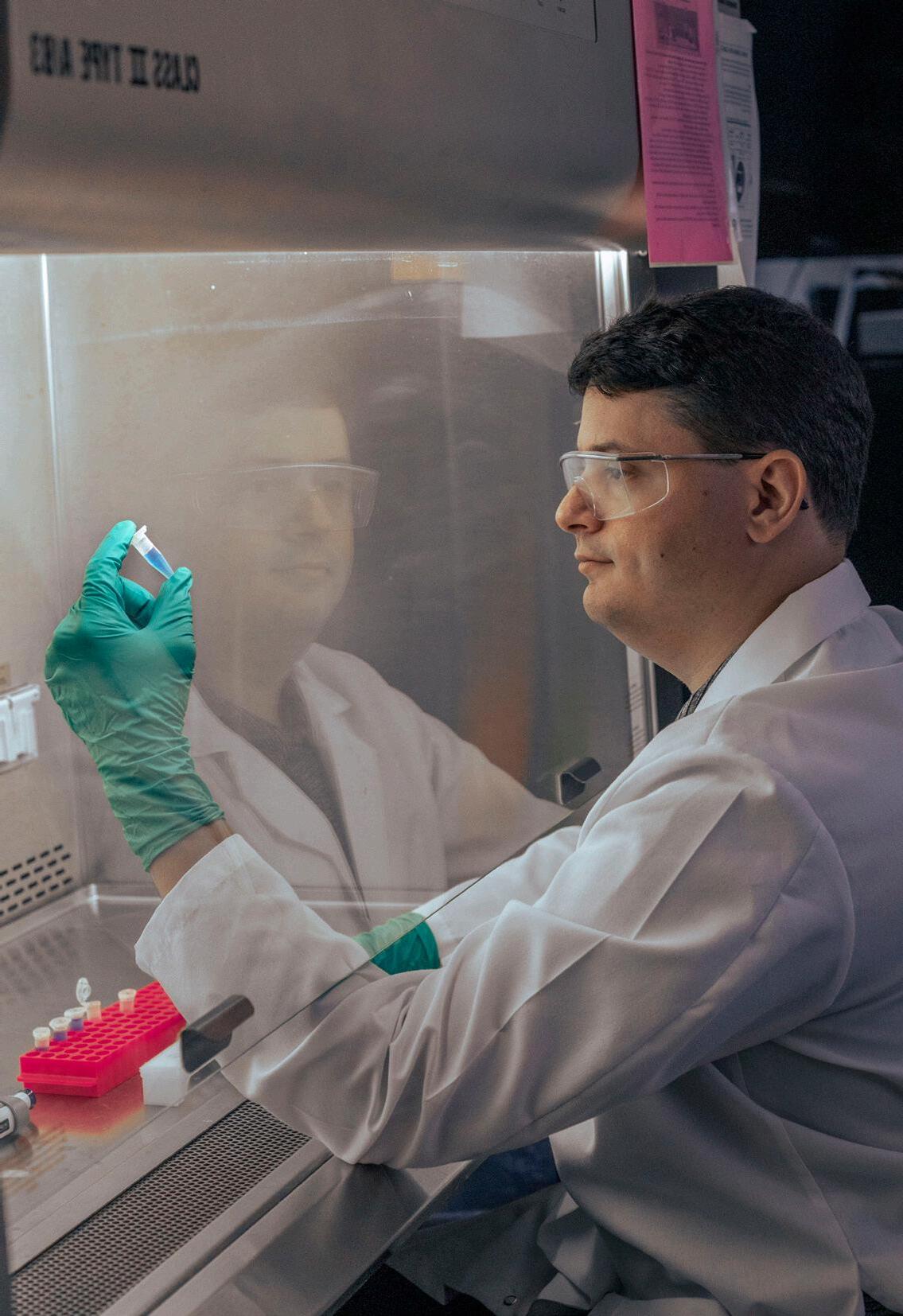
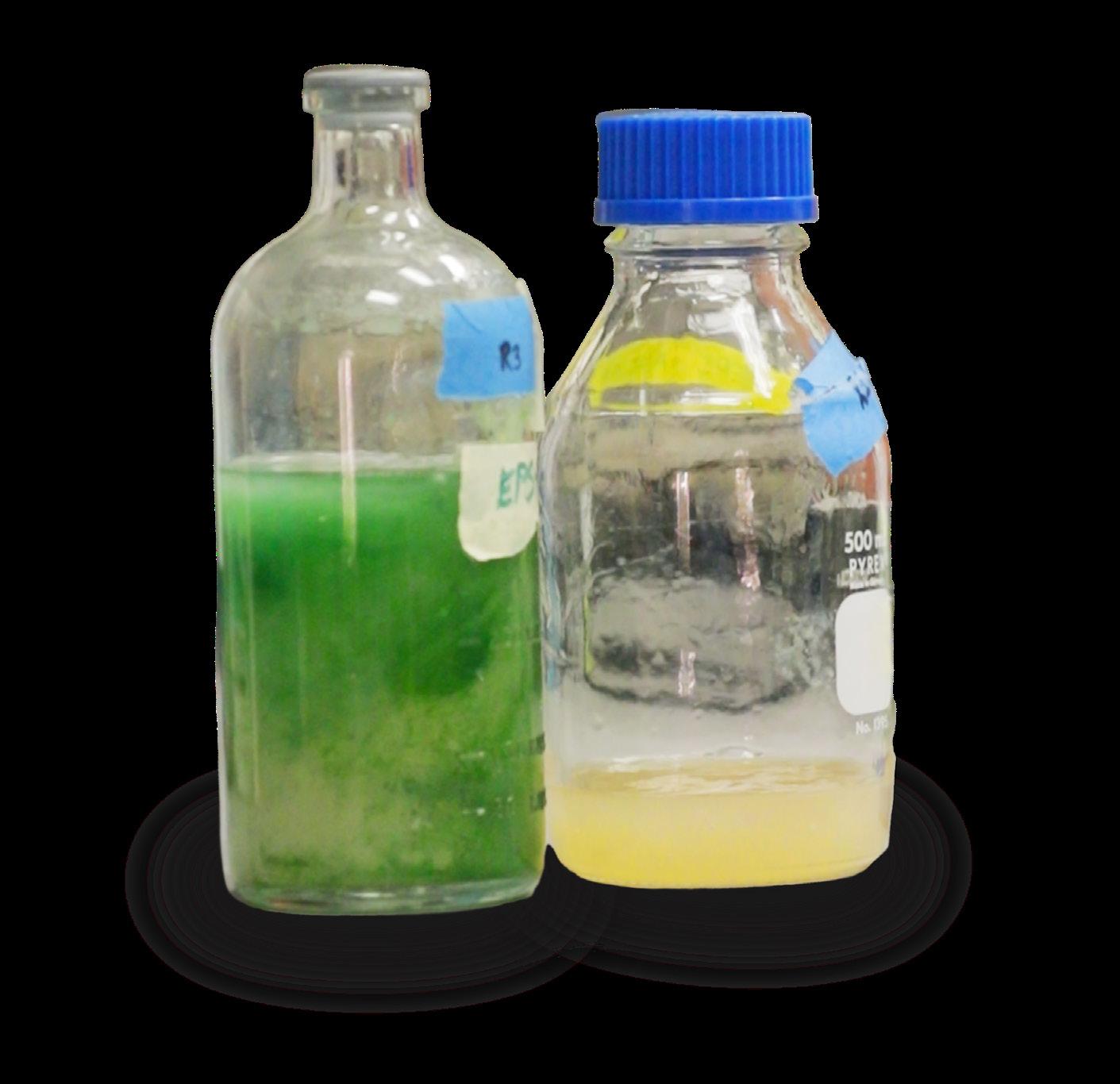
The left bottle contains harvested cyanobacteria biomass along with its externally produced polymer product, whereas the right bottle contains only the collected and isolated polymer.
ABE UPDATE Fall 2024 | 11
Pictured here is Phycocyanin, a blue pigment extracted from algae as a valuable bioproduct for use in the food, clothing, and pharmaceutical industries.
Decoding Earth’s Secrets Through RemoteSensing
JASMEET JUDGE IS DISCOVERING THE SECRETS OF AGRICULTURE WITHIN THE COSMOS
DR. JASMEET JUDGE , a professor at the University of Florida’s Agricultural and Biological Engineering Department, has devoted her career to understanding Earth’s systems through remote sensing.
As the Director of the Center for Remote Sensing at the University of Florida, Dr. Judge leads research that connects space exploration with observations of our planet. Her work explores the relationship between satellite-based sensors orbiting high above Earth and the crucial information they provide about soil, vegetation, and agricultural conditions.
Remote sensing, as Dr. Judge explains, offers a unique view of Earth, allowing scientists to explore both space and our planet’s sur -
face. While space exploration makes us think of telescopes trained on stars or rovers on other planets, remote sensing focuses on Earth, capturing essential data about our environment.
According to Dr. Judge, when it comes to space, you have the option to look outward or inward, “In my research, I focus on utilizing data obtained by satellites observing Earth from above, and applying it to agricultural purposes.”
In her research, Dr. Judge uses satellite data to study agricultural landscapes, particularly utilizing microwave wavelengths. But why microwave sensors specifically? Dr. Judge explains that microwaves, with their longer wavelengths, possess a unique sensitivity to water and soil properties, making them ideal for agricultural monitoring. Unlike visible or infrared light, microwaves penetrate clouds and operate day and night, making them invaluable for monitoring crop conditions and soil moisture levels.
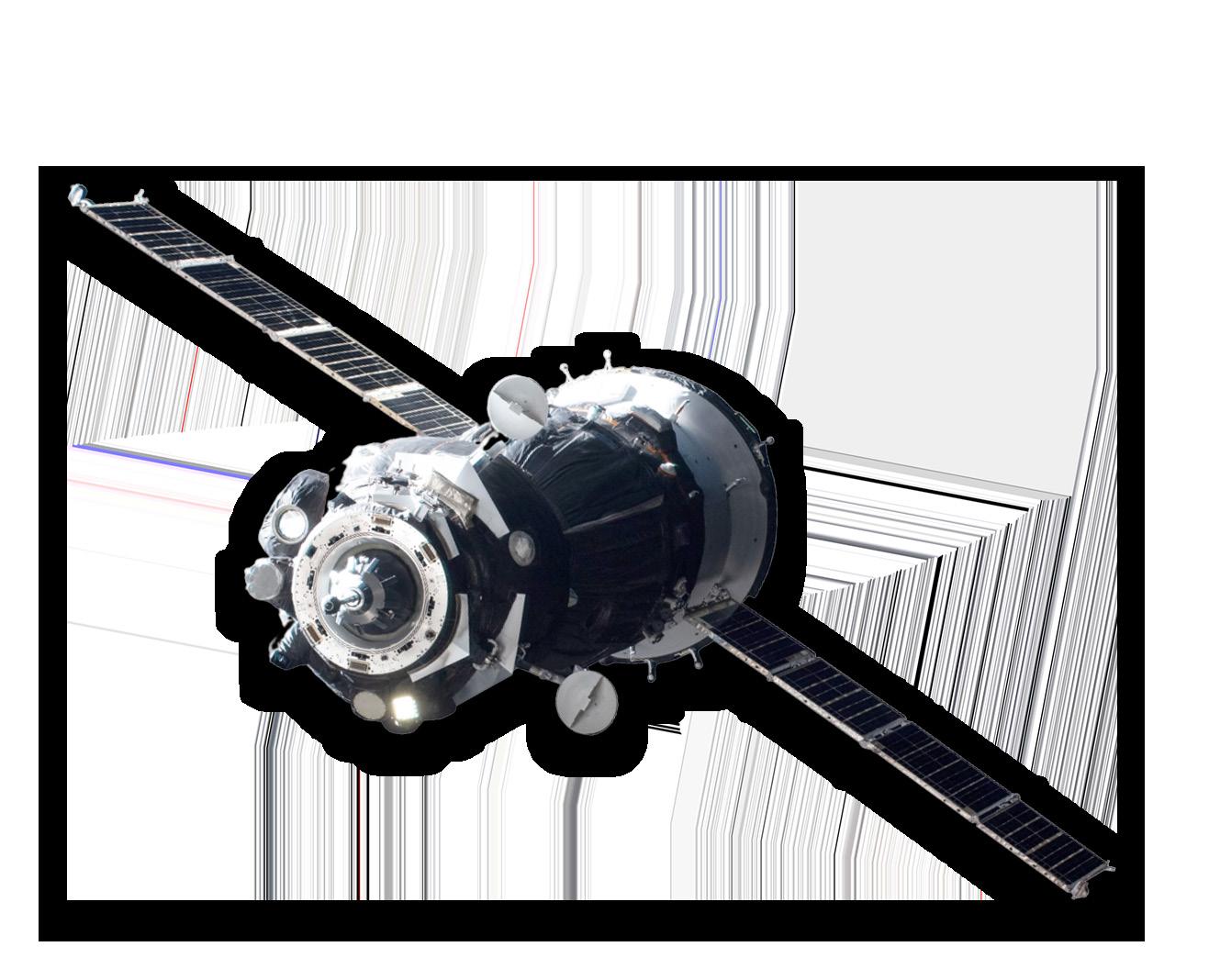
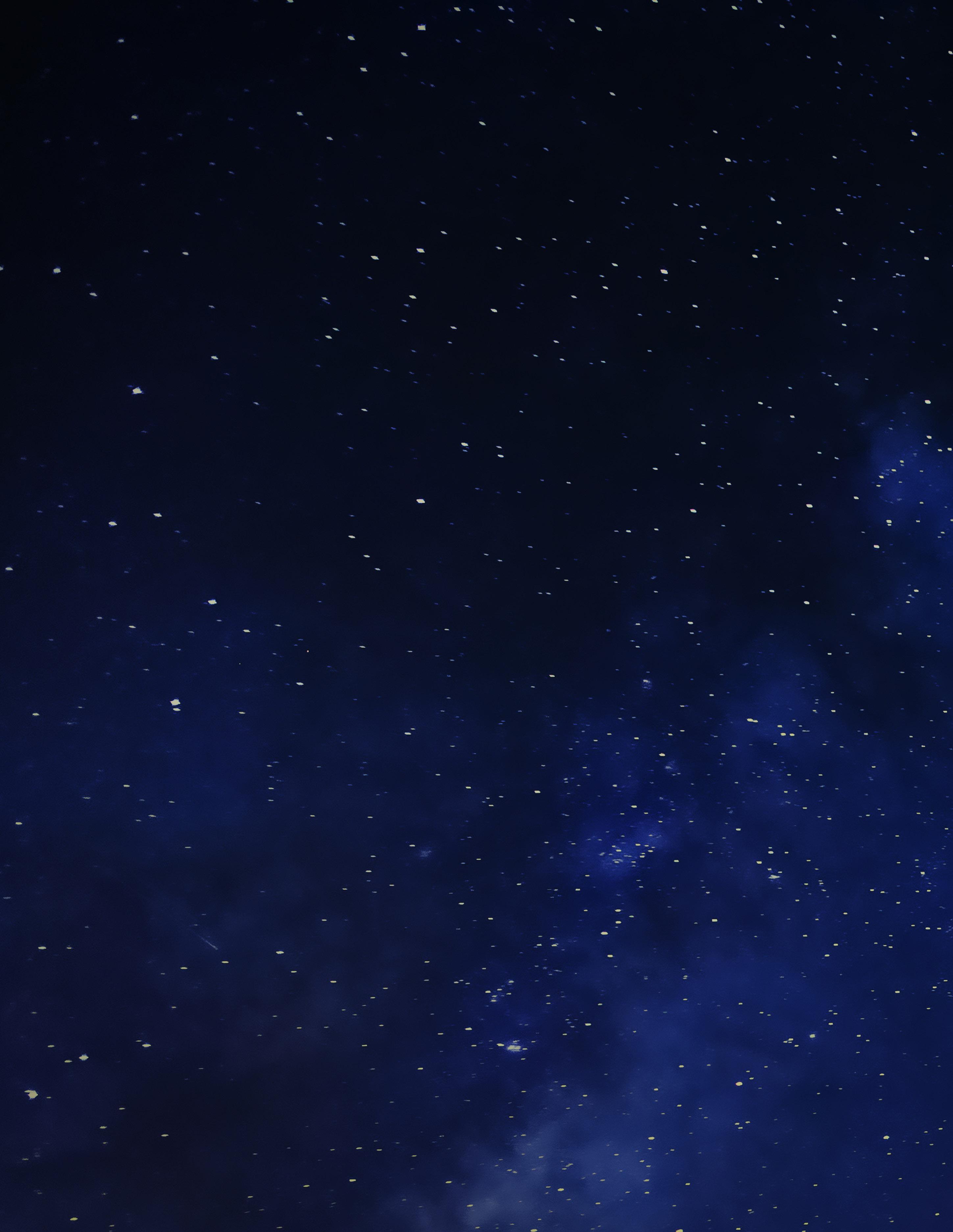
“The primary goal,” Dr. Judge emphasizes, “is to use remote sensing to understand soil and vegetation conditions, including soil moisture, water content, crop growth, and yield.” By leveraging microwave sensors aboard satellites, her research aims to provide farmers with crucial information for optimizing irrigation strategies, enhancing crop productivity, and mitigating the impacts of water stress.
Dr. Judge’s research goes beyond simple observation; it involves developing advanced algorithms and models to extract meaningful insights from extensive satellite data. By integrating ground-based measurements with space -
borne observations, her team refines algorithms to accurately estimate soil moisture and crop conditions, advancing precision agriculture.
I focus on utilizing data obtained by satellites observing Earth from above, and applying it to agricultural purposes. “ ”

From informing irrigation decisions in agricultural regions to aiding landuse planning and natural resource management, her work holds immense promise for addressing pressing environmental challenges.
In a world where the boundaries between Earth and space blur, Dr. Jasmeet Judge’s research highlights the connection between our exploration of space and our planet. As humanity faces the challenges of the 21st century, her work is leading us toward a more sustainable and resilient future.
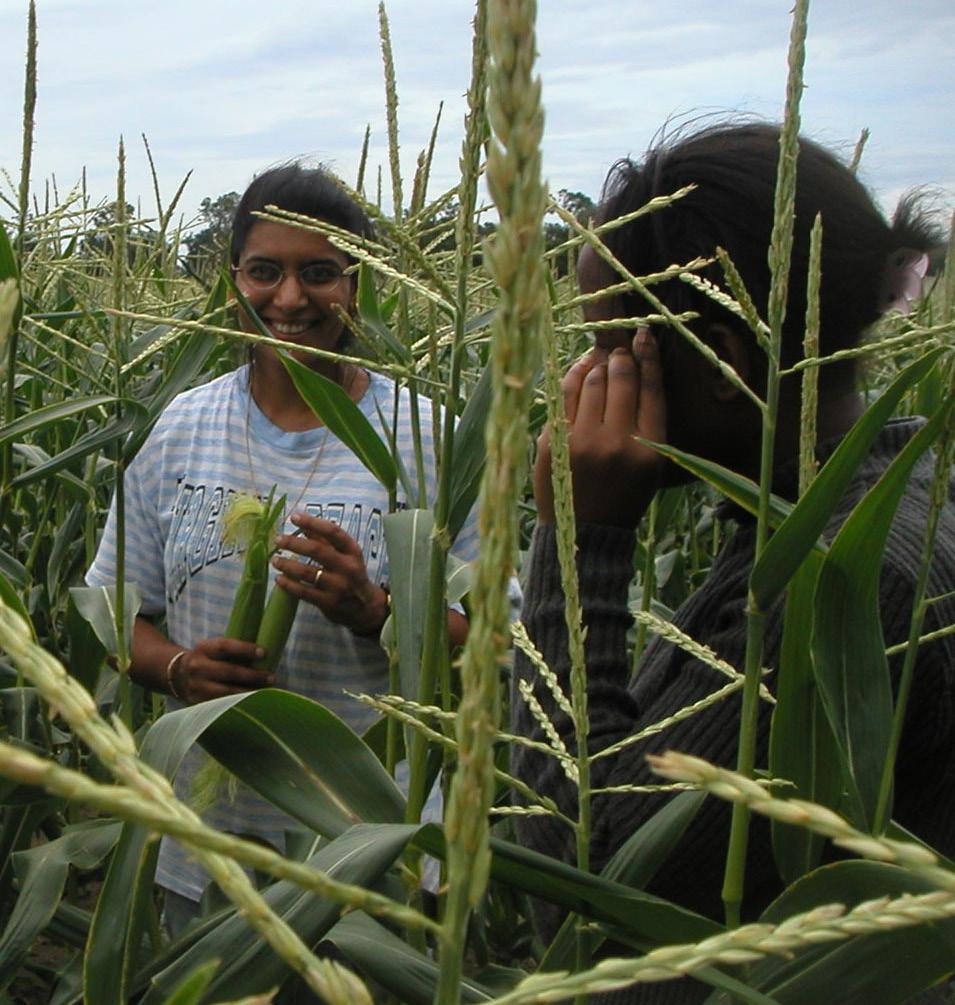
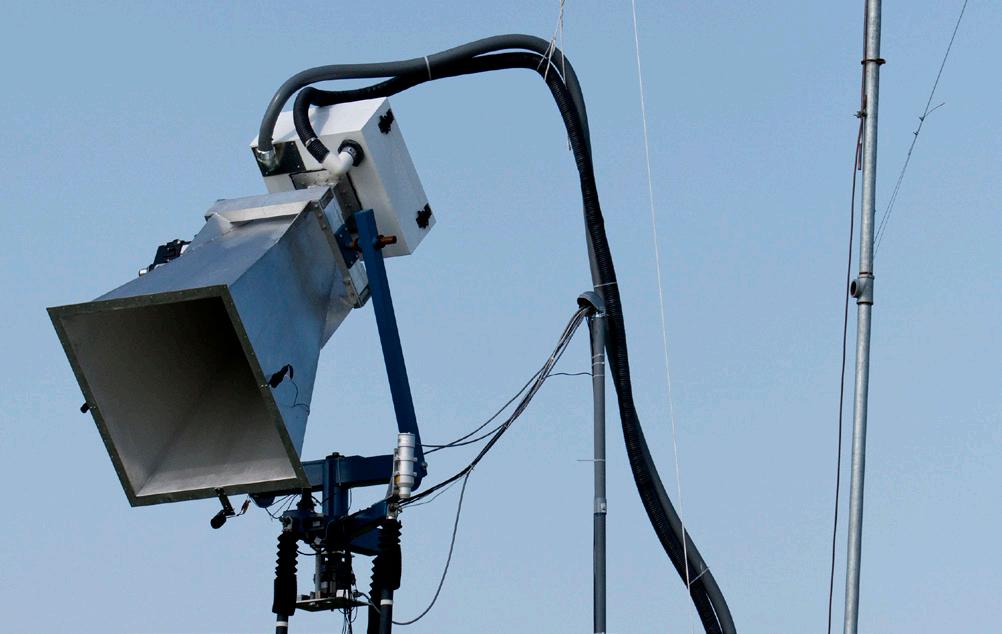
 Dr. Jasmeet Judge stands in the field with her team collecting remote sensing data.
Dr. Jasmeet Judge stands in the field with her team collecting remote sensing data.
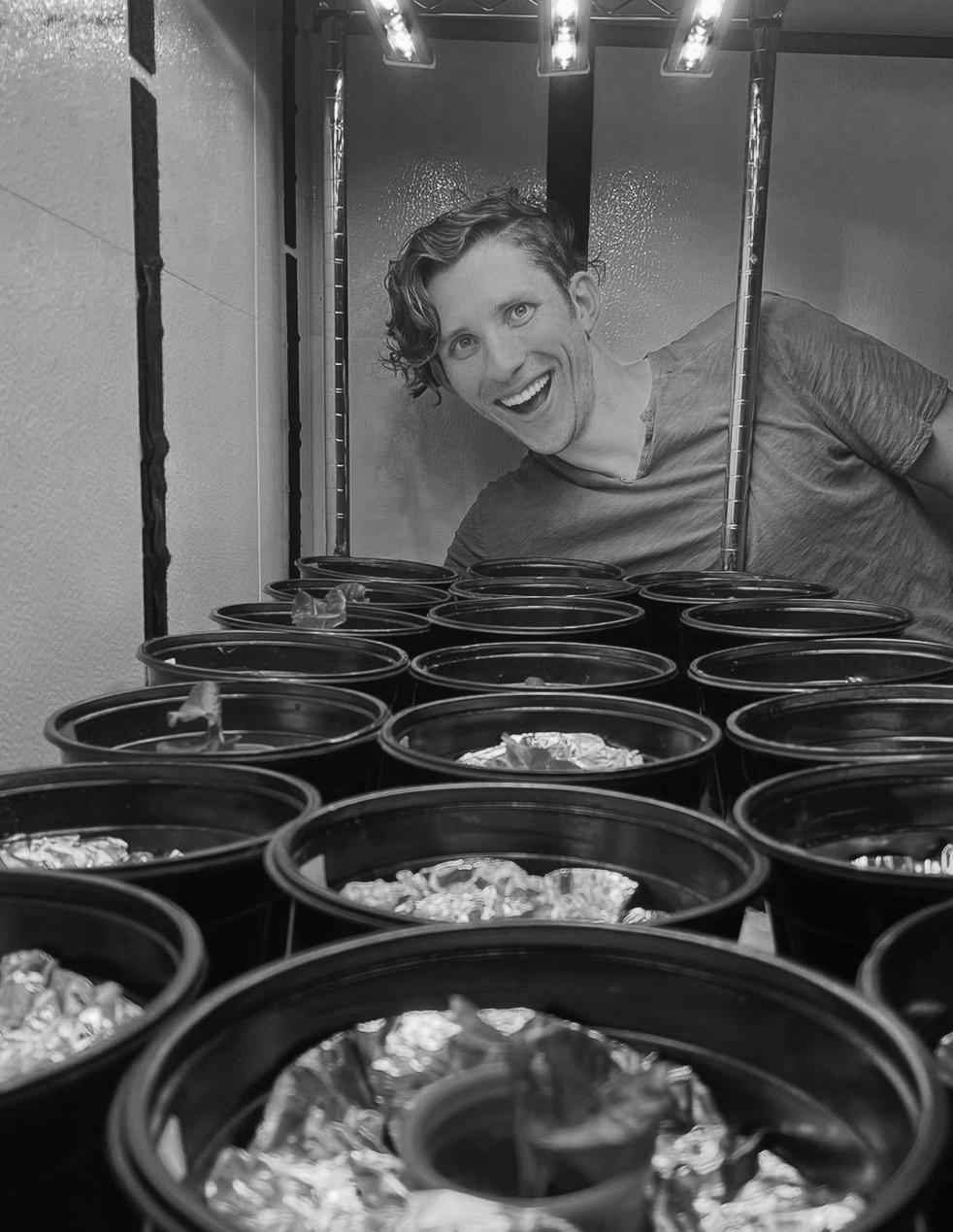
Harvesting among the Stars
DONALD COON IS SHAPING THE FUTURE OF SPACE CROP FORECASTING

IIn the pursuit of sustainable food production beyond Earth, DONALD COON, a PhD student in the Agricultural and Biological Engineering Department at the University of Florida, is making significant contributions. Under the guidance of his advisor, DR. ANA MARTINRYALS, his research focuses on the modified energy cascade crop systems model, a crucial tool for predicting crop yield and transpiration in controlled environments, particularly designed for space agriculture.
The modified energy cascade model is a key component in the realm of space agriculture. Born out of the challenges of nurturing crops in space’s unforgiving environment, it serves as a reliable guide, offering insights into crucial factors like water consumption, oxygen production, and the yield of edible crops. Over time, it has evolved to adapt to advancing technology and scientific understanding.
Donald’s work straddles the intersection of human exploration and agricultural advancement. Originally designed to sustain life beyond our planet, the modified energy cascade model holds promise for ensuring the well-being of astronauts on their extraterrestrial journeys. By providing precise insights into crop behavior and resource management, it lays the groundwork for self-sustaining ecosystems crucial for long-duration space missions, transforming science fiction into tangible reality.
Yet, Donald’s vision extends beyond the confines of our planet. He recognizes the pressing need to modernize and refine this model, ensuring its relevance and accuracy in contemporary agricultural practices. With advancements in computational power and optimization techniques, Donald envisions a revolution in both spaceflight operations and terrestrial agriculture through the combination of this crop model with decision support and resource management systems.
One notable aspect of Donald’s research is its connection to the forerunners of space agriculture. The lineage of the Modified Energy Cascade model, stretching back over three decades, bears witness to the contributions of space agriculture pioneers like Ray Wheeler, Bruce Bugbee, and James Cavazzoni. Donald’s interactions with these innovators remind him of his role in this esteemed legacy.
Looking ahead, Donald envisions a future where the modified energy cascade model serves as a unified tool for controlled environments, bridging the gap between space and Earth. Leveraging computational optimization and scientific innovation, he aims to revolutionize crop production, not only for space exploration but also for indoor plant farming on our planet.
Donald’s research represents a significant step forward in space agriculture. With his commitment and efforts, he aims to contribute to sustainable food production both in space and on Earth. As humanity explores new frontiers, his work joins others in paving a path toward a future where space and agriculture seamlessly intertwine.
ABE UPDATE Fall 2024 | 15
Digital Twins for Space Agriculture
STEPHEN LANTIN IS ON A JOURNEY TO MAKE FOOD PRODUCTION SUSTAINABLE IN SPACE
What is a? Digital Twin
A DIGITAL TWIN is like a virtual clone or mirror image of a physical object, system, or process. It’s created by gathering data from sensors embedded in the real-world object or system and using that data to build and continuously update a digital model. This digital twin behaves similarly to its real-world counterpart, allowing for analysis, simulation, monitoring, and even prediction of its behavior and performance. It’s used in various fields like manufacturing, healthcare, and space exploration to optimize operations, troubleshoot issues, and test scenarios without directly impacting the physical object or system.
In the halls of the University of Florida’s Agricultural and Biological Engineering (ABE) department, several dedicated students and faculty are pushing the boundaries of agricultural innovation to new heights, quite literally. Meet STEPHEN LANTIN , a fifth-year PhD and a NASA fellowship recipient, whose research is poised to revolutionize how we cultivate crops in space. Guided by the expertise of ABE associate professors DR. MELANIE CORRELL and Assistant Professor DR. ADITYA SINGH , Lantin’s journey is a mix of passion, innovation, and the relentless pursuit of scientific discovery.
Stephen’s research revolves around the development of digital twins for plant production in space. This endeavor is driven by NASA’s need to establish sustainable food sources for future missions to the Moon and Mars where crew time is precious, and resources are scarce. The concept of digital twins involves creating virtual models of physical systems, allowing real-time monitoring, prediction, and control. By seamlessly integrating sensors with these mod -
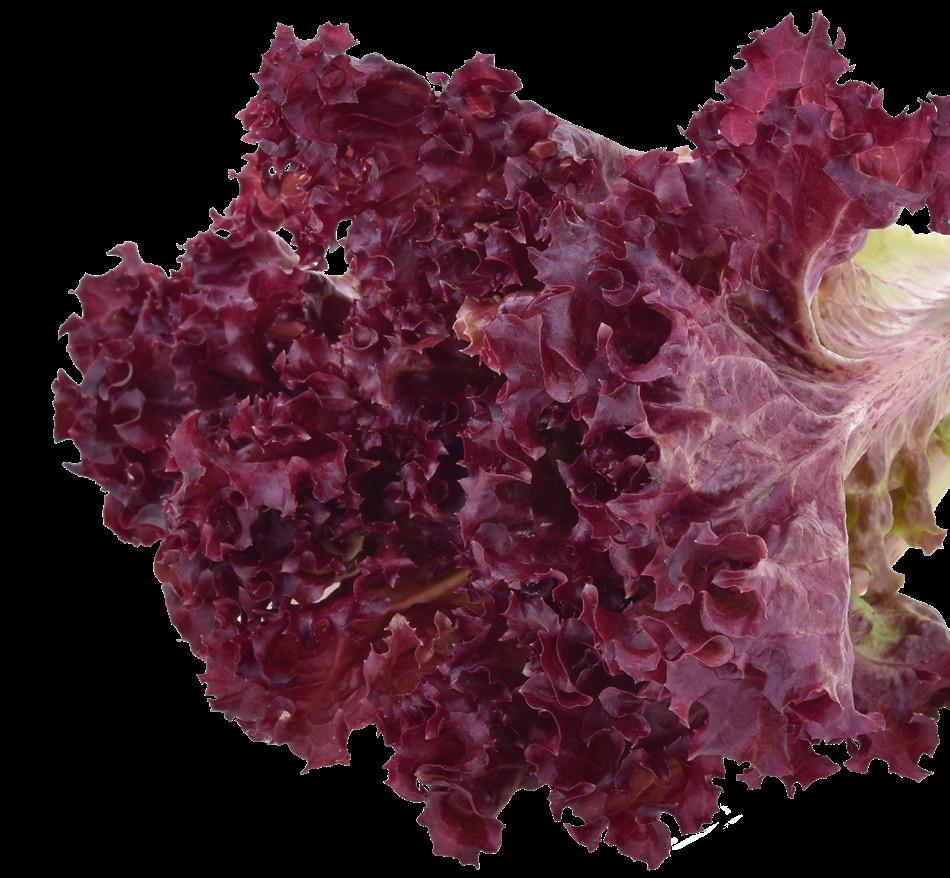
els, he aims to autonomously nurture crops in the challenging confines of space.
At the core of Stephen’s research lies a focus on predicting nutrient content in plants—a vital factor for sustaining astronauts’ health during extended space missions. Utilizing hyperspectral imaging to analyze plant data across numerous wave bands with high spectral resolution, Lantin’s research centers on a specific variety of red romaine lettuce called Outredgeous, which is cultivated aboard the International Space Station.
But why lettuce? Stephen explains that lettuce is chosen for its fast growth and compact size, making it suitable for space experiments with limited space. Additionally, Outredgeous lettuce possesses a nutritional profile tailored to meet astronauts dietary needs. From anthocyanins to beta carotene, this leafy green is packed with essential nutrients vital for long-duration space missions.
Beyond his work within the Agricultural and Biological Engineering Department, Stephen’s experiences and opportunities outside the department have shaped his perspective and skill set, allowing him to make an even greater impact in the field. Originating from his internship at NASA’s Kennedy Space Center, Stephen sought to develop autonomous systems for plant data collection.
ABE UPDATE 16 | Fall 2024

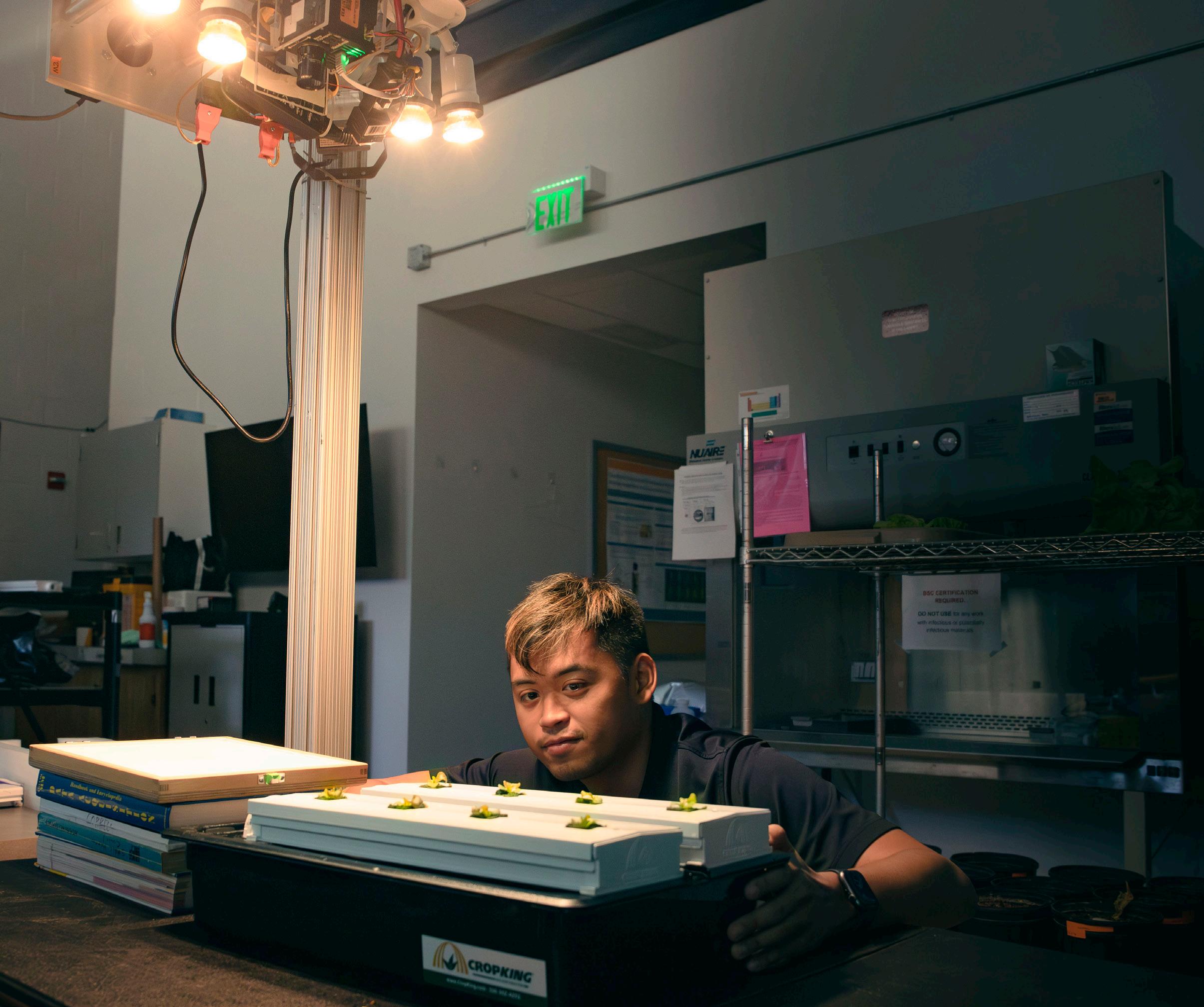
With assistance from undergraduate seniors, Mario Molina, Mily Gandhi, Kayla Ng and, Ashley Peters, he brought STELLA to fruition. Short for Spatio-Temporal Evaluator for Lettuce Logistics Automation, the gantry-based imaging system utilizes advanced imaging techniques to track the growth of lettuce plants, providing valuable insights into their development over time. Stephen highlighted the importance of STELLA, describing it as a “game-changer” in the realm of plant data collection. Its impact lies in its potential to automate plant scouting, a critical aspect as space missions venture further from low-earth orbit.
As Stephen progresses in his academic journey, the mentorship within the agricultural and biological engineering department has undeniably shaped his path. Collaborating with his academic advisors,
Stephen Lantin uses a hyperspectral camera in the Scanning Plant IOT Facility (SPOT) to scan hydroponic lettuce, revealing internal plant details such as nutrient levels.
Dr. Melanie Correll and Dr. Aditya Singh, has been particularly influential. Dr. Correll’s expertise in developing tools for plant breeders and Dr. Singh’s specialization in advanced imaging techniques have offered invaluable guidance and support to Stephen’s research in space agriculture. Together, they are pushing the boundaries of agricultural research.
As Stephen prepares for his final NASA internship, perfecting his digital twin technology and exploring novel methods for sustainable crop production beyond Earth, the countdown to humanity’s next giant leap begins. From developing autonomous systems for plant data collection to studying microbiomes on lettuce, Stephen Lantin stands among the innovative students within the Agricultural and Biological Engineering department who are leading a new era of space agriculture.
Fall 2024 | 17
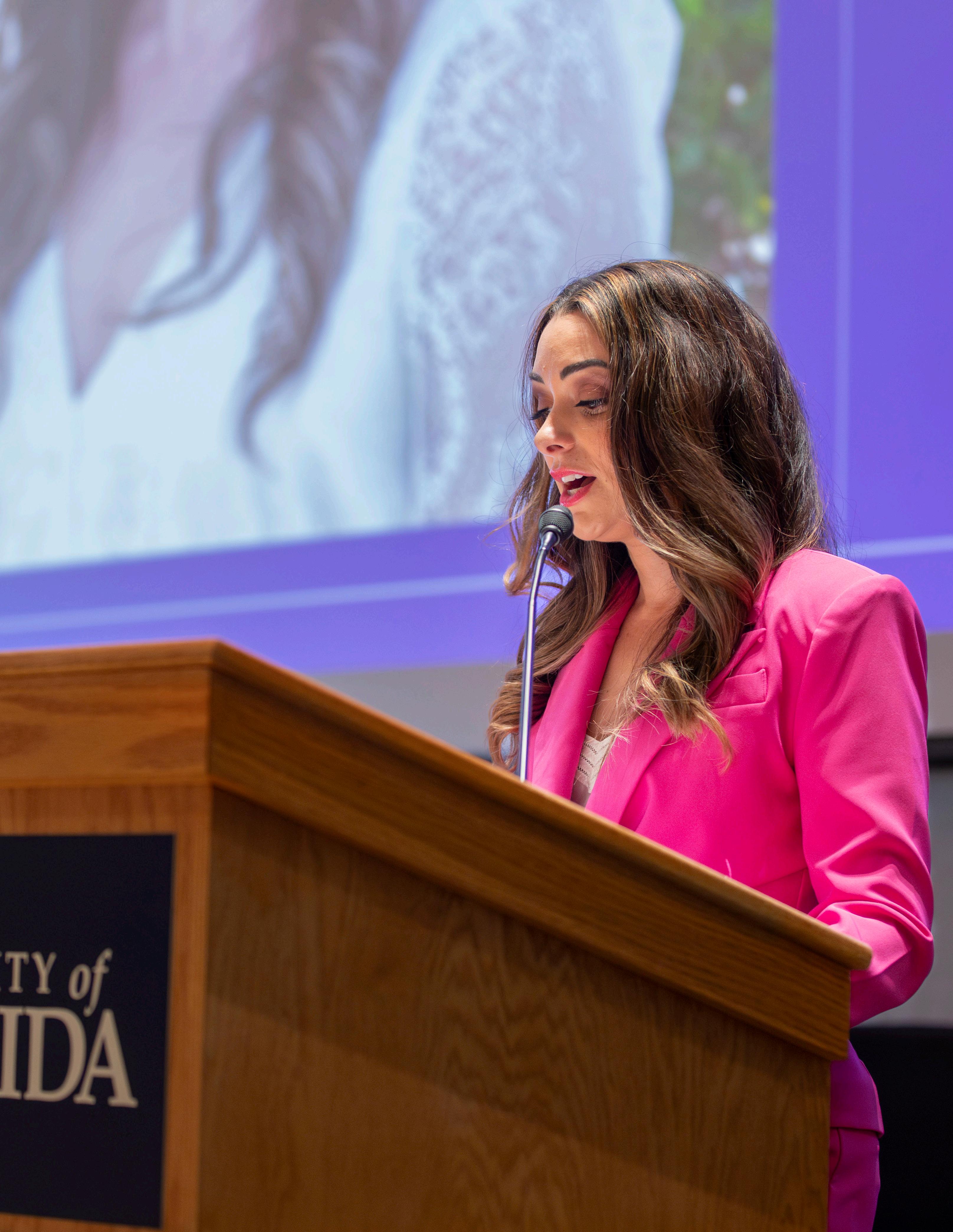
The Power ofPerserverance
Melissa Germain is a prominent figure in the fields of packaging science and agricultural engineering, known for her innovative contributions to sustainable packaging solutions and cold chain management. With a strong focus on environmental sustainability and a dedication to pushing the boundaries of what is achievable, Melissa has made a significant impact on her industry and beyond.
Originating from Florida, Melissa embarked on her journey to becoming a respected authority in applied cold chain management at the University of Florida. She earned her Bachelor of Science degree in 2009 and continued her academic pursuits, driven by a passion for sustainability and a vision to revolutionize the transportation of temperature-sensitive products. Melissa obtained her Master of Science in Agricultural and Biological Engineering from the University of Florida in 2010.
UF ABE ALUMNA, MELISSA GERMAIN, SHARES A WORD OF ENCOURAGEMENT TO OUR 2024 GRADS
her graduate send-off speech: “In the face of adversity, I made a choice—not to be deterred by the doubts of others, but to trust in my own intuition. It wasn’t easy. There were moments of doubt and setbacks. But through sheer determination and belief in the vision, I pressed on.”
Indeed, Melissa’s perseverance has yielded significant results. Her patented inventions, including the groundbreaking TTx technology, have reshaped the industry landscape, contributing to vital efforts such as the global fight against the COVID-19 pandemic and facilitating transportation to the International Space Station in partnership with SpaceX.
Let your passion be your guiding light to venture into the unknown and challenge the status quo.
“ ”
During her graduate studies, Melissa conducted research at the Cryogenics Laboratory at NASA Kennedy Space Center, laying the groundwork for her future endeavors. Her research focused on developing sustainable packaging and unconventional insulation materials for temperature-sensitive pharmaceutical products, showcasing a rare blend of technical expertise and forward-thinking innovation.
Upon completing her studies, Melissa co-founded The Illuminate Group in 2010, specializing in applied cold chain management for the food and pharmaceutical industry. Serving as CEO, Melissa has led The Illuminate Group to prominence, known for delivering innovative solutions that prioritize both performance and environmental responsibility.Melissa’s journey is characterized by her unwavering commitment to her vision, even in the face of skepticism and challenges. as she shared in
Beyond her entrepreneurial endeavors, Melissa is deeply committed to fostering innovation and collaboration within her community. As the Director of Innovation and Development for Blueye, LLC, and through her previous roles at institutions such as the Georgia Tech Research Institute and the University of South Florida Polytechnic, Melissa has played a pivotal role in advancing cold chain technology and forging strategic alliances across industries.
Outside of her professional pursuits, Melissa finds joy in spending time with her family and pursuing her passion for exploration. An avid scuba diver and outdoor enthusiast, she embraces the spirit of adventure both above and below the surface: “Let your passion be your guiding light to venture into the unknown and challenge the status quo.”
As Melissa continues to inspire and innovate, her legacy serves as a testament to the transformative power of perseverance, vision, and a relentless pursuit of excellence. With her unwavering commitment to sustainability and her pioneering spirit, Melissa Germain continues to make waves in her industry and beyond.
ABE UPDATE Fall 2024 | 19
Doctoral and Master’s Degree Graduates
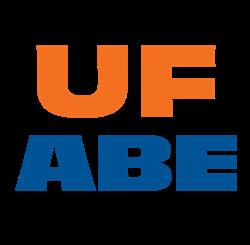
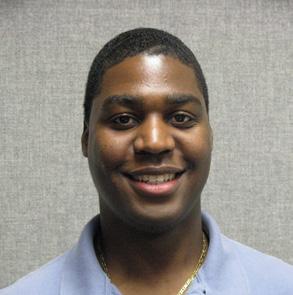

Adam Fuerst
Master of Science (M.S)
Environmental Sustainability
Advisor: Dr. Sanjay Shukla
Lesly Jerome
Master of Science (M.S)
Sustainability
Advisor: Dr. Pierce Jones
Breanna Sorrells
Master of Science (M.S)
Stormwater
Advisor: Dr. Eban Bean
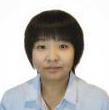
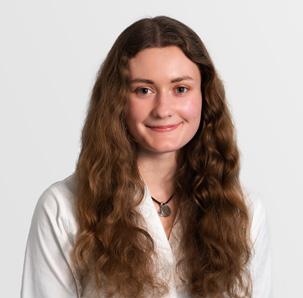
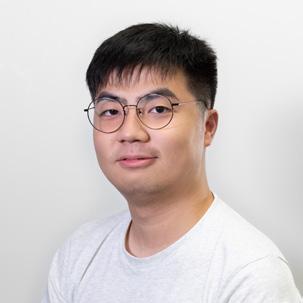
Master of Science (M.S)
Agricultural Operations Management Advisor: Dr. Wonsuk “Daniel” Lee Thanyachanok Sutthanonkul
Doctor of Philosophy (Ph.D.)
Land and Water Resources Engineering
Advisor: Dr. Haimanote Bayabil & Dr. Ana Martin-Ryals Kelsey Vought
Doctor of Philosophy (Ph.D.)
Nanotechnology
Advisor: Dr. Bin Gao Yicheng Yang
2024 Biological Engineering Bachelor’s Degrees
Jared Beaufait
Bachelor of Science (B.S.)
Biological Engineering
Kira Berg
Bachelor of Science (B.S.)
Biological Engineering
Brian Chen
Bachelor of Science (B.S.)
Biological Engineering
Benjamin Covert
Bachelor of Science (B.S.)
Biological Engineering
Sarah Daly
Bachelor of Science (B.S.)
Biological Engineering
Camila Del Sol Pina
Bachelor of Science (B.S.)
Biological Engineering
Tori Dew
Bachelor of Science (B.S.)
Biological Engineering
Mily Gandhi
Bachelor of Science (B.S.)
Biological Engineering
Kyle Kalarchian
Bachelor of Science (B.S.)
Biological Engineering
Kayla Ng
Bachelor of Science (B.S.)
Biological Engineering
Ashley Peters
Bachelor of Science (B.S.)
Biological Engineering
Melvin Rodriguez
Bachelor of Science (B.S.)
Biological Engineering
Sasha Sanchez
Bachelor of Science (B.S.)
Biological Engineering

ABE UPDATE 20 | Fall 2024
UF/ABE
B.S. Agricultural Operations Management Graduate - Jacob Boyd
2024 Agricultural Operations Management
Bachelor’s Degrees
Ronaldo Appo
Bachelor of Science (B.S.)
Agricultural Operations Management
Jacob Boyd
Bachelor of Science (B.S.)
Agricultural Operations Management
Blake Braswell
Bachelor of Science (B.S.)
Agricultural Operations Management
Hannah Burdett
Bachelor of Science (B.S.) Agricultural Operations Management
Sierra Cochran
Bachelor of Science (B.S.)
Agricultural Operations Management
Joseph Davies
Bachelor of Science (B.S.)
Agricultural Operations Management
Giovanni Diogo
Bachelor of Science (B.S.)
Agricultural Operations Management
August Healy
Bachelor of Science (B.S.)
Agricultural Operations Management
Chase Johnson
Bachelor of Science (B.S.)
Agricultural Operations Management
Cade McLaughlin
Bachelor of Science (B.S.)
Agricultural Operations Management
Jacob Muller
Bachelor of Science (B.S.)
Agricultural Operations Management
Claudio Ortega-Franco
Bachelor of Science (B.S.)
Agricultural Operations Management
Hailey Raulerson
Bachelor of Science (B.S.)
Agricultural Operations Management
Carson Russo
Bachelor of Science (B.S.)
Agricultural Operations Management
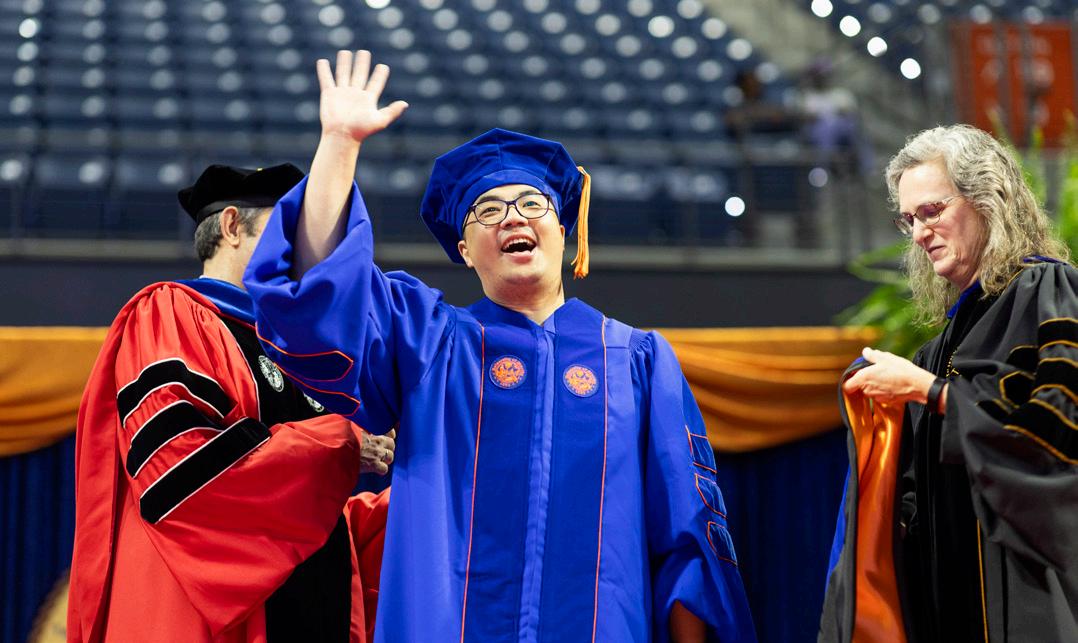
Chase Russo
Bachelor of Science (B.S.)
Agricultural Operations Management
Kelsey Scales
Bachelor of Science (B.S.)
Agricultural Operations Management
Luke Sigrist
Bachelor of Science (B.S.)
Agricultural Operations Management
William Thuesen
Bachelor of Science (B.S.)
Agricultural Operations Management
Cole Verano
Bachelor of Science (B.S.)
Agricultural Operations Management
Katrina Wu
Bachelor of Science (B.S.)
Agricultural Operations Management
Zhengyuan Xie
Bachelor of Science (B.S.)
Agricultural Operations Management
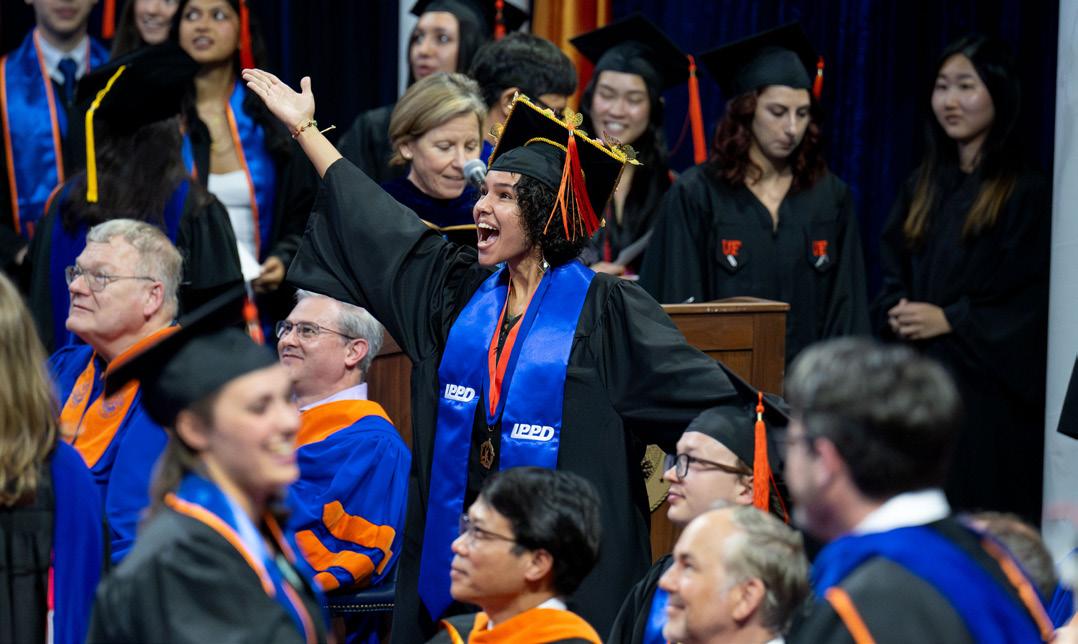
ABE UPDATE Fall 2024 | 21
UF/ABE Ph.D. Graduae - Dr. Yicheng Yang
UF/ABE B.S. Biological Engineering Graduate - Camila Del Sol Pina
ABE UPDATE 2023 - 2024 Advisory Board
The ABE Advisory Board provides guidance on a range of matters and play a vital role in shaping the direction and priorities of the department. Through regular meetings and consultation, the Board helps to ensure that the department remains a leader in the field of agricultural and biological engineering.
Del Bottcher
President
Soil and Water Engineering Technology, Inc.
Leslie Gowdish Managing Director Asset Life Cycle Management
Justin H. Gregory Senior Manager Jones Edmunds
Noah Handley VP of Engineering & Land Management Lykes Bros. Inc.
Allison Horowitz
Bacardi OC Project Manager Bacardi
Shawny Marsden Director, Strategic Innovation CropTrak

Hunter R. Merrill Lead Data Scientist, Environment Modeling Team
Ryan Miller
Senior Systems Engineer II 3M
Alicia A. Modenbach Lecturer, Student Coordinator Services University of Kentucky
Eldon Muller Worldwide Safety Walt Disney Parks and Resorts
Daniel Rutland Senior Water Resources Project Manager Jacobs
Stephanie Seawright Chief Operations Officer Central Florida Community Action Agency, Inc.
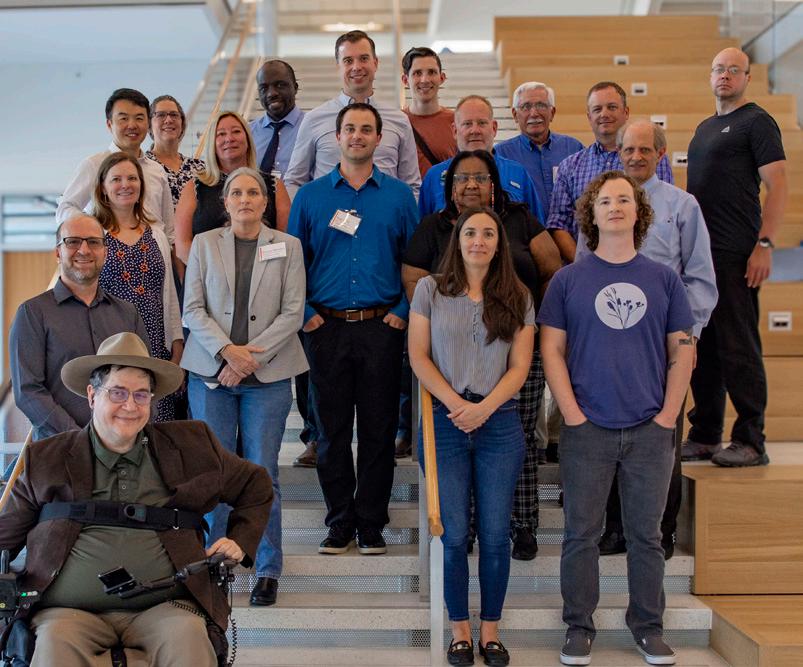
Cristian Toma Founder and Chief Science Officer Kalera Inc.
Chris Towne Kimley-Horn and Associates, Inc.
Evan Shane Williams Stormwater Engineer Alachua County Environmental Protection Department
Kevin Wright Vice President of Lands for Southeast Oak River Farms, LLC
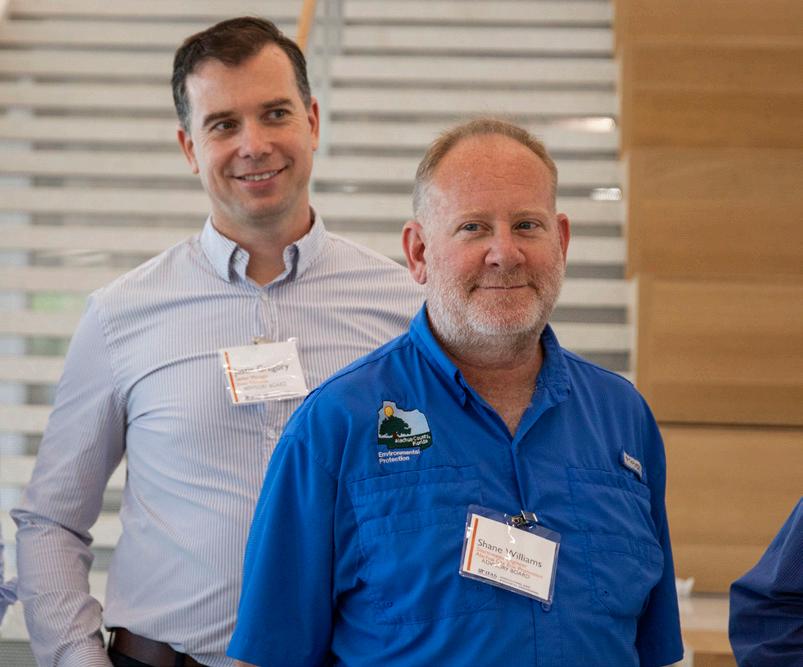
2024 UF/ABE Alumni Awards
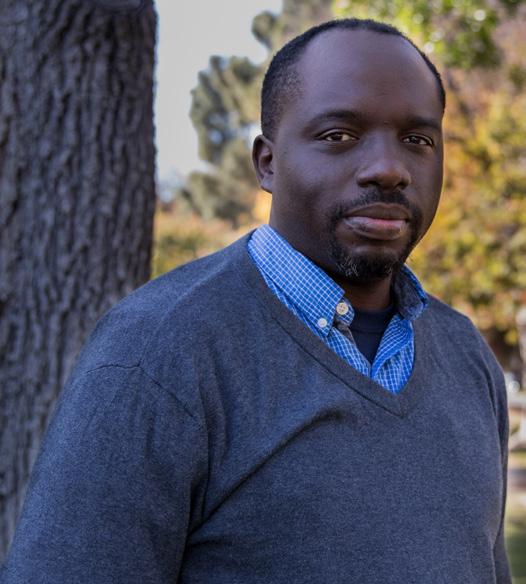
UF/ABE DISTINGUISHED ALUMNI AWARD
Isaya Kisekka Professor & Director University of California, Davis
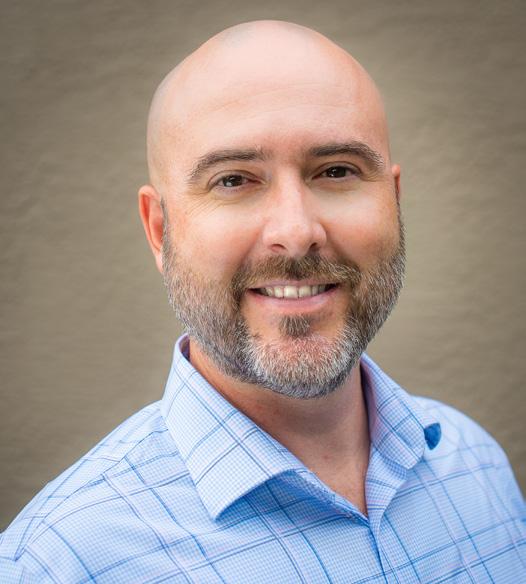
UF/ABE DISTINGUISHED SERVICE AWARD
Daniel Rutland Senior Water Resources Project Manager Jacobs
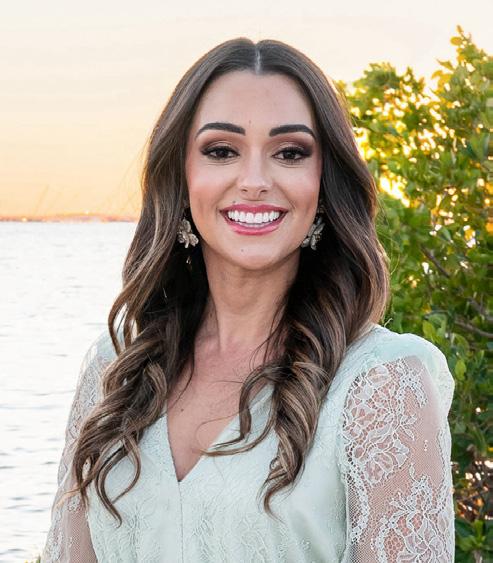
UF/ABE DISTINGUISHED ALUMNI AWARD
Melissa Germain Co-Founder & CEO The Illuminate Group
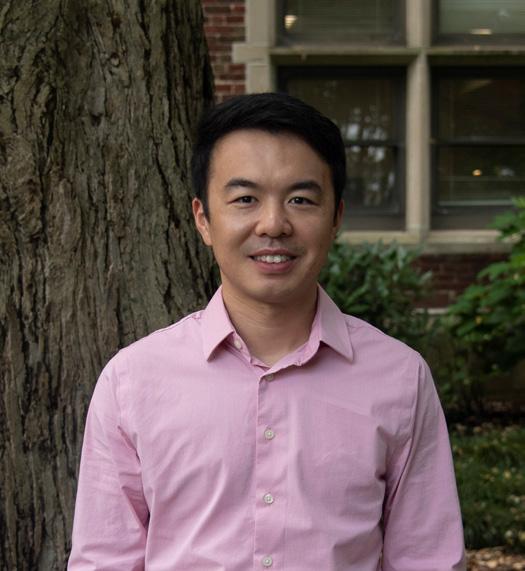
UF/ABE OUTSTANDING YOUNG ALUMNUS AWARD
Hao Gan Assistant Professor University of Tennessee
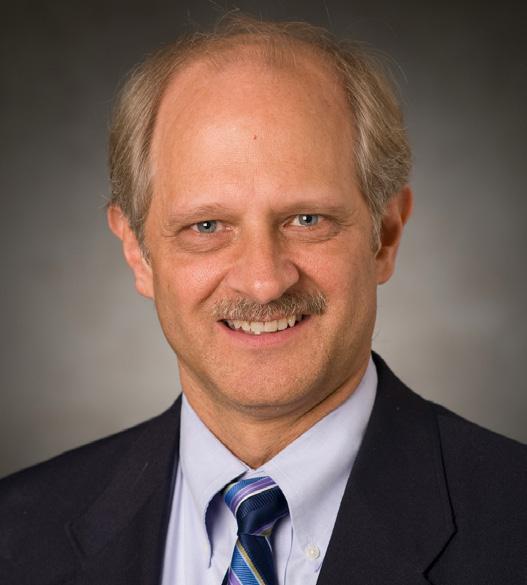
UF/ABE DISTINGUISHED ACHIEVEMENT AWARD
Paul Heinemann Professor Penn State University

UF/ABE OUTSTANDING YOUNG ALUMNUS AWARD
Natalie Nelson Associate Professor & University Faculty Scholar North Carolina State University
The UF/IFAS Agricultural and Biological Engineering department honors our alumni and friends who work to further enhance our discipline and industry. Scan the QR code to read more about our 2024 Alumni Award Winners.

ABE UPDATE Fall 2024 | 23
SCAN HERE
Awards and Accomplishments
Faculty, Staff, and Alumni Awards
• Yiannis Ampatzidis Most Productive and Promising Faculty Members as UFRF Professors for 2024
• Rafael Muñoz-Carpena UF/IFAS 2024 Culture of Nomination Award
• Rafael Muñoz-Carpena UF/IFAS 2024 HighImpact Research Publication Award
• Melanie Corell 2024 Research Large Grant Leadership Award
• Jasmeet Judge UF/IFAS 2024 Award of Excellence for Graduate Research
• Vivek Sharma 2024 Research Large Grant Leadership Award
• Adam Watson 2024 CALS Undergraduate Faculty Mentor/Advisor of the year
• Adam Watson 2024 UF Undergraduate Faculty Mentor/Advisor of the year
• Ziwen Yu UF/IFAS High-Impact Research Publication Award
• Ying Zhang 2024 Research Large Grant Leadership Award
Student Awards
• Adam Howe Water Institute Spring 2024 Travel Award
• Bibek Acharya 2024 UF AAW Honorable Mention Emerging Scholar Award
• Nathan O’Neil Recognition for Placing in the 2024 UF Water Institute Symposium Poster Symposium Competition
• Fernando Aristizabal UF/IFAS 2024 Award of Excellence for Graduate Research
• Fabio Oliveira 1st Place in the 2024 UF/ABE Poster Symposium
• Donald Coon 2nd Place in the 2024 UF/ABE Poster Symposium
• Jean Pompeo Best Overall 1st Year Graduate
• Ryan Ames Best Overall Undergraduate
• Jacob Muller Best Overall Undergraduate
Scholarships and Fellowships
• Fabio Oliveira McNair Bostick Student Scholarship
• Rio Bonham Campbells Scholarship
• Chase Johnson Sun Fu “Tony” Shih Scholarship
• Katrina Wu Sun Fu “Tony” Shih Scholarship
• Kennedy Belknap John B. Boy/US Sugar in Agricultural Engineering Fund
• Ryan Lam John B. Boy/US Sugar in Agricultural Engineering Fund
• Kayla Ng John B. Boy/US Sugar in Agricultural Engineering Fund
• Mario Molina John B. Boy/US Sugar in Agricultural Engineering Fund
• Sarah Daly Allen G. Smajstrala Scholarship
• Nicholas Manco Allen G. Smajstrala Scholarship
• Ryan Ames Florida Section ASABE Scholarship Fund
• Andy Brantmeyer Florida Section ASABE Scholarship Fund
• Jacob Muller Florida Section ASABE Scholarship Fund
• Camila Del Sol Pina Florida Section ASABE Scholarship Fund
• Kelsey Scales Florida Section ASABE Scholarship Fund
• Colby Stover Florida Section ASABE Scholarship Fund
• Ethan Lantzy Giles & Martha Van Duyne Scholarship
• Serenity Wilcox Bob and Virginia Peart Scholarship
• Kayla Herman Marlin Eller Memorial MWI Corporation Scholarship
• Mily Gandhi Rush E. Choate Scholarship
ABE UPDATE 24 | Fall 2024
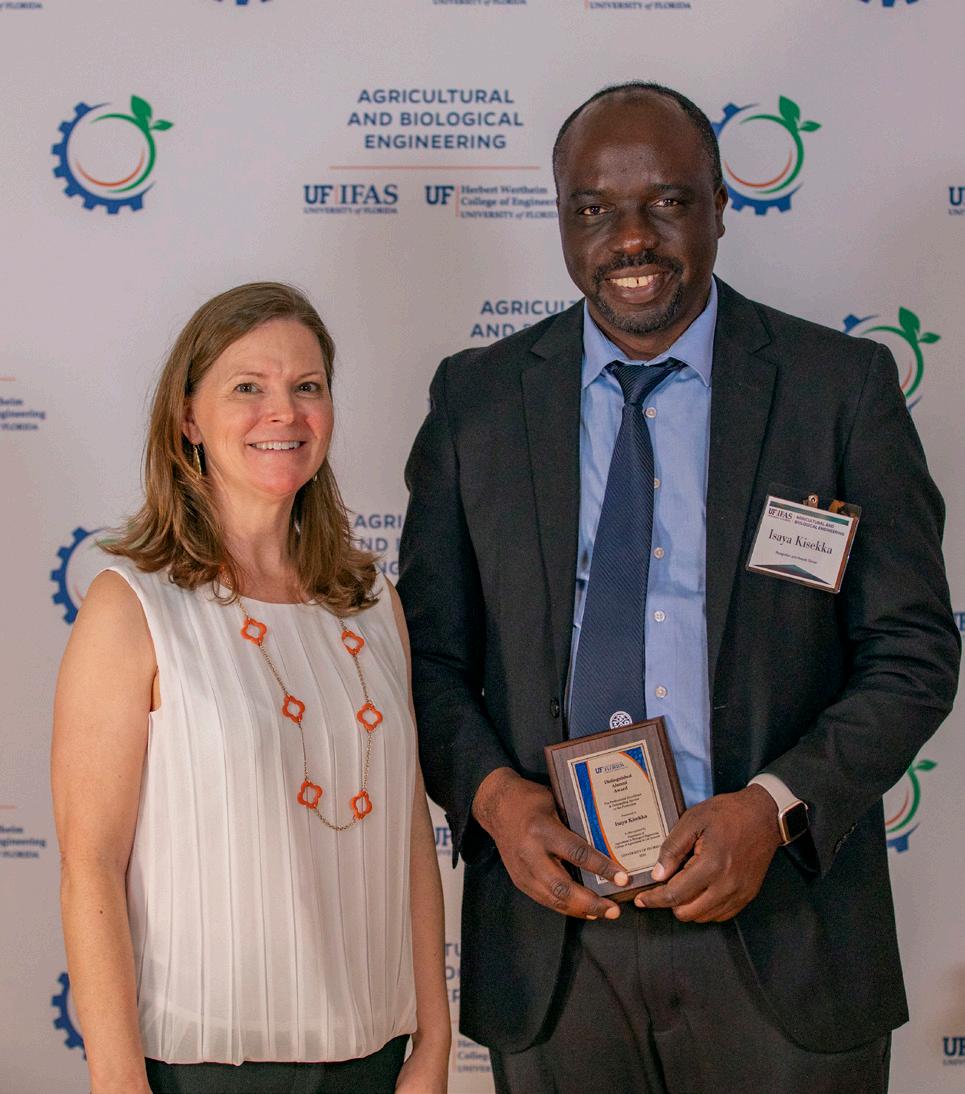
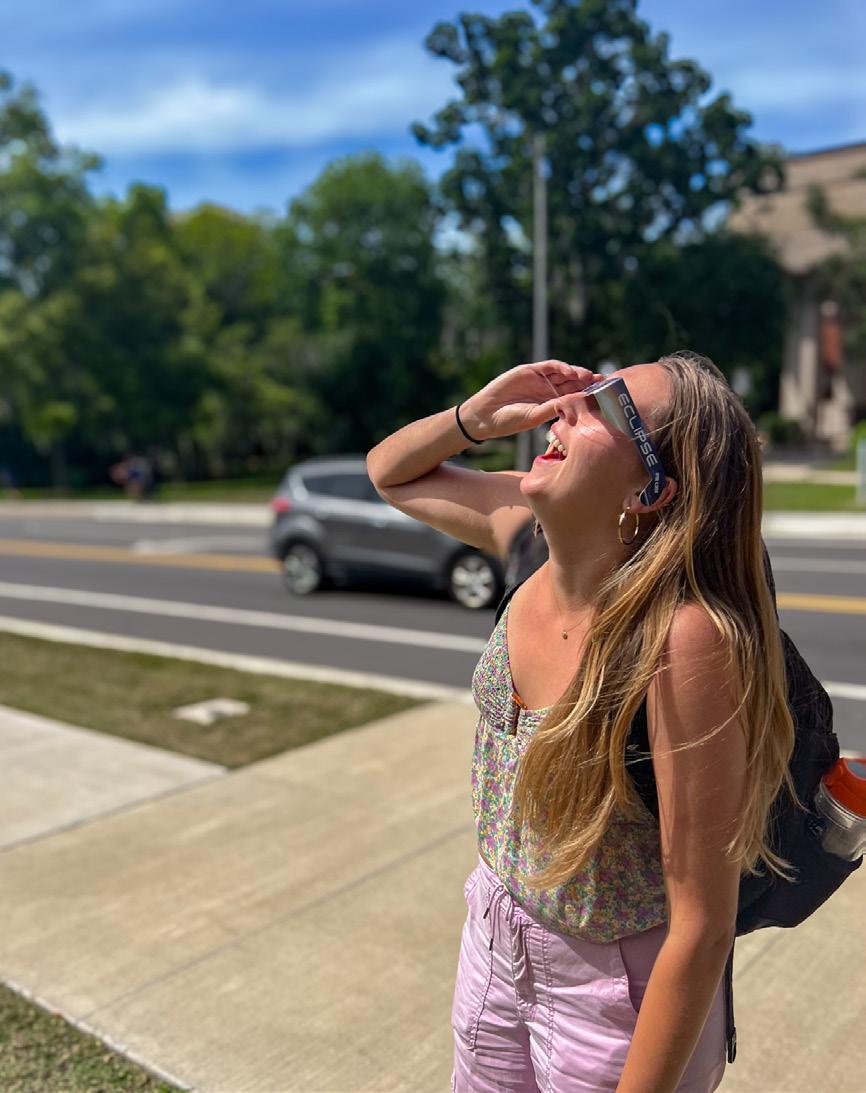

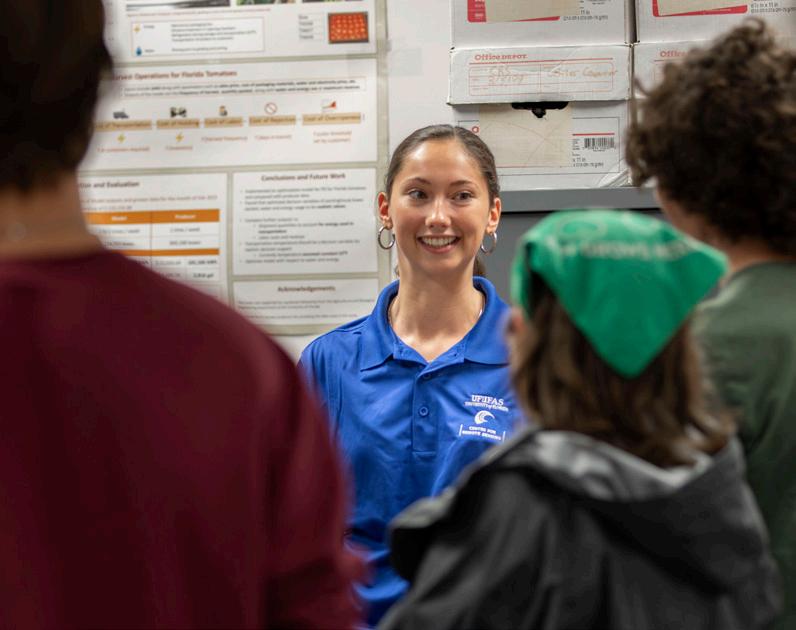
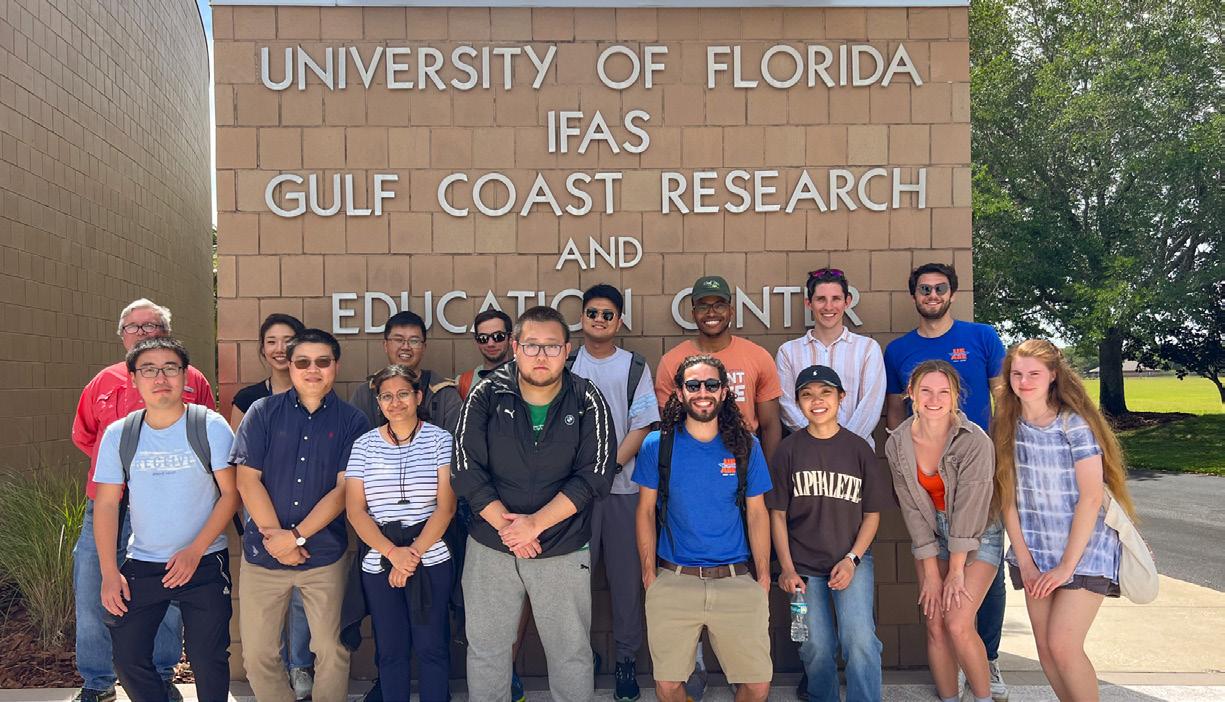
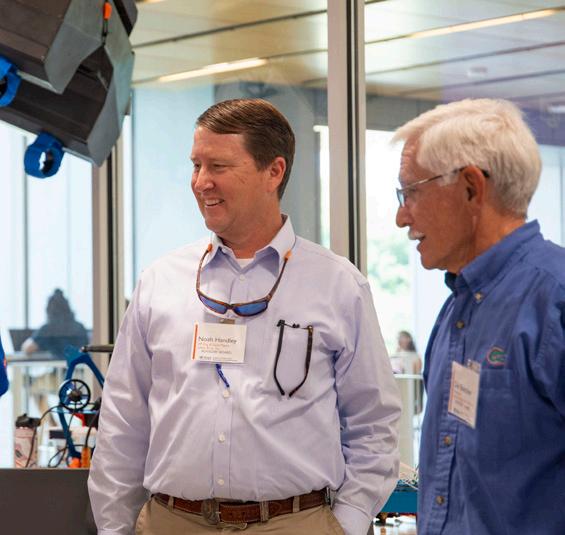
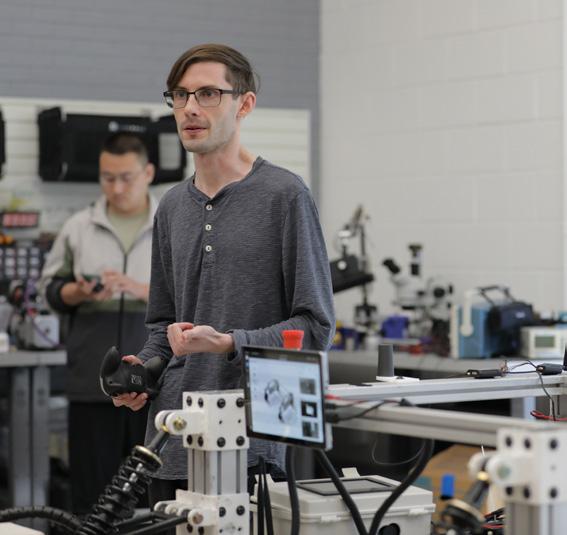
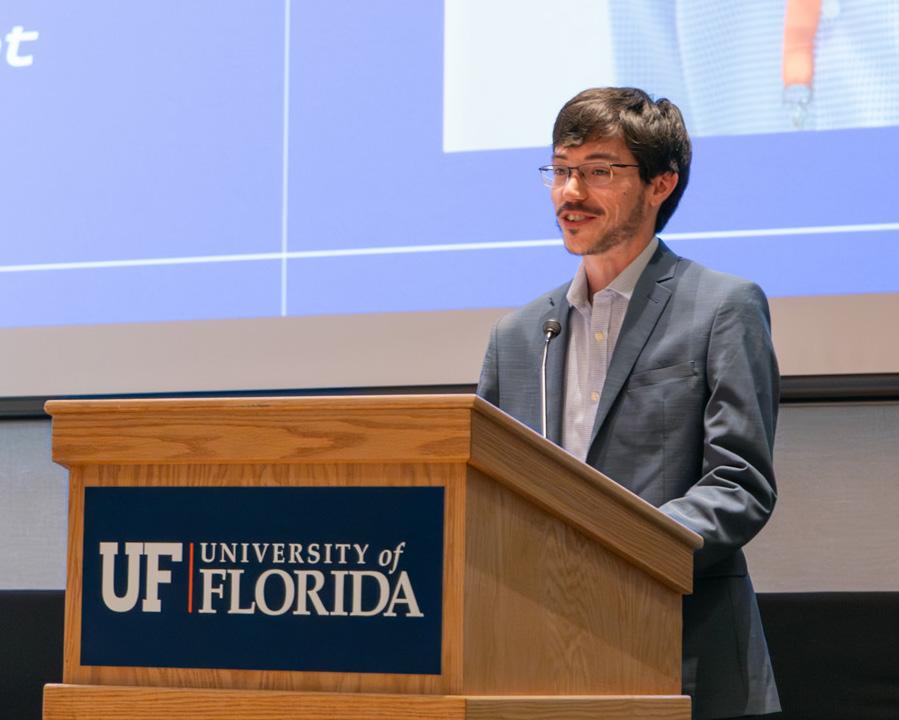
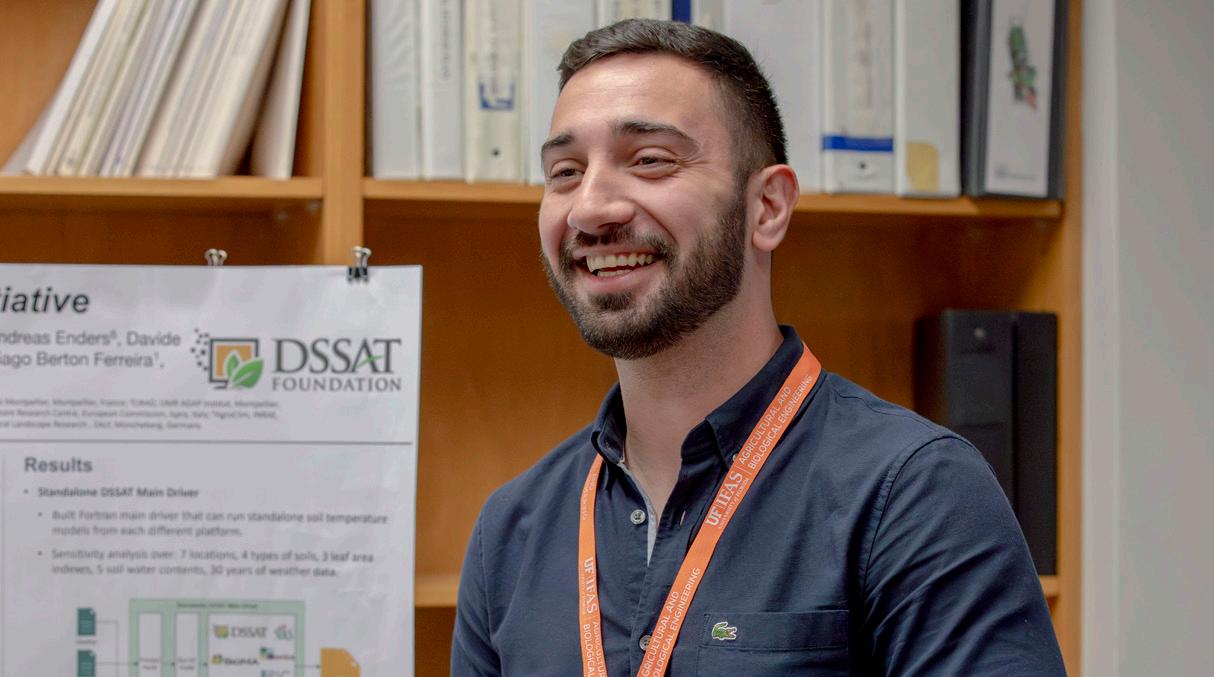
LEFT TO RIGHT: 1. DR. ISAYA KISEKKA STANDS WITH ABE CHAIR, DR. KATI MIGLIACCIO TO ACCEPT THE 2024 UF/ABE DISTINGUISHED ALUMNI AWARD. 2. ABE AOM STUDENT SERENITY WILLIAMS VIEWS THE SOLAR ECLIPSE WITH CLASSMATES. UP AND DOWN: 3. NEW ABE ADVISORY BOARD MEMBER, NOAH HANDLEY, STANDS WITH ADVISORY BOARD MEMBER, DEL BOTTCHER INSIDE MALACHOWSKY HALL. 4. ABE PH.D STUDENT, DANIEL PETTI SHARES THE MARS-X ROBOT DURING E-WEEK. LEFT TO RIGHT: 5. ABE EMERITUS FACULTY, DOROTA HAMAN, VIEWS A HONEYBEE COLONY AT THE EMERITUS & RETIRED FACULTY LUNCHEON. 6. ABE STUDENT, SARAH DALY, SHARES WITH PROSPECTIVE STUDENTS ABOUT REMOTE SENSING. 7. ABE STUDENT JACOB MULLER SPEAKS ABOUT HIS EXCITEMENT FOR THE FUTURE ABE TEACHING BUILDING AT THE ABE AWARDS CEREMONY. 8. ABE GRADUATE STUDENTS POSE FOR A PHOTO AFTER A TRIP TO THE UF GULF COAST RESEARCH & EDUCATION CENTER. 9. ABE GRADUATE STUDENT, FABIO OLIVEIRA, SMILES AS HE PRESENTS HIS RESEARCH AT THE 2024 ABE POSTER SYMPOSIUM WHERE HE PLACED 1ST.
ABE UPDATE Fall 2024 | 25
Connect With UF ABE

ABE UPDATE
Learn More About ABE on Our Website We would love to keep in touch with you! Here are a few ways to stay connected with UF Agricultural and Biological Engineering. abe.ufl.edu

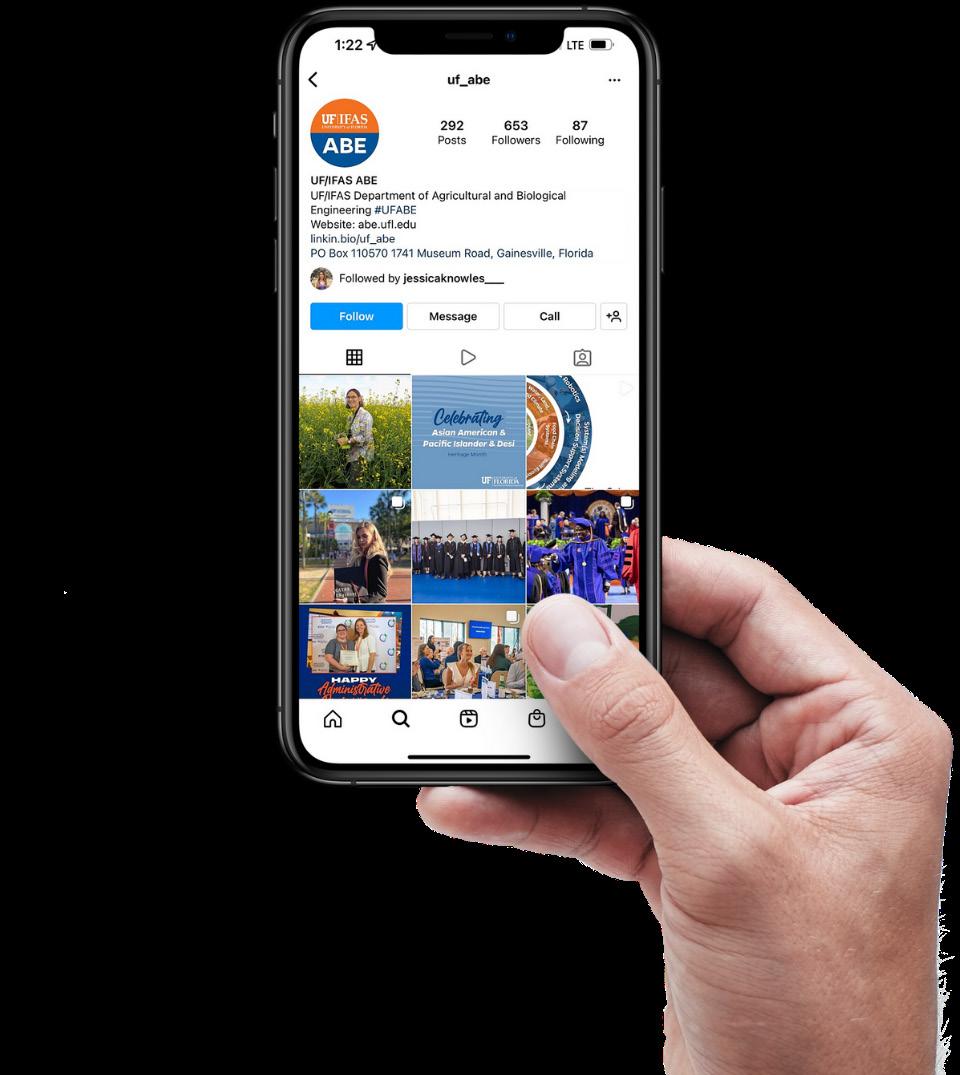
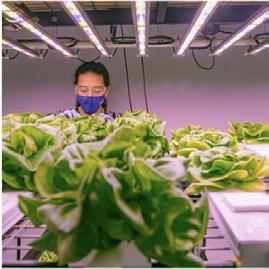
ABE UPDATE Follow Us on Social Media /company/ufabe Subscribe to our monthly emails to keep up with all the exciting stories that are happening in the ABE department! Sign up at abe.ufl.edu/newsletter



ABE UPDATE 28 | Fall 2024 @ UF_ABE Connect With Us! /ufloridaabe @ UF_ABE /company/ufabe UF/IFAS Agricultural and Biological Engineering Department 120 Frazier Rogers Hall PO Box 110570 Gainesville, FL 32611-0570 352-392-1864 abe.ufl.edu Your generous donation to the UF/IFAS Agricultural and Biological Engineering program will provide support for our students, faculty and staff. To support ABE, our scholarships and more, visit abe.ufl.edu/give GIVING











 KATI MIGLIACCIO, PH.D.
KATI MIGLIACCIO, PH.D.
















 Dr. Jasmeet Judge stands in the field with her team collecting remote sensing data.
Dr. Jasmeet Judge stands in the field with her team collecting remote sensing data.







































